
[ * ] An asterisk appears where sensitive information has been removed in accordance with the Access to Information Act and Privacy Act.
This book provides overarching information on federal departments and portfolios (e.g., operating budget, full-time equivalents) an overview of the portfolio’s existing operating environment, as well Deputy Ministers’ biographical information.
To provide leadership in the growth and development of a competitive, innovative and sustainable Canadian agriculture and agri-food sector.
Overview: The agriculture and agri-food sector (the sector) is a key economic driver to the Canadian economy, generating over $115.7 billion of gross domestic product and $64.6 billion in exports annually in 2017. The Agriculture and Agri-Food Portfolio works with federal, provincial, territorial, industry, and academic partners to support the sector in taking advantage of opportunities in domestic and international markets; advance science and innovation to increase knowledge and strengthen the sector’s competitive advantages; as well as help producers anticipate, mitigate, and respond to sector risk in a manner that supports sustainable growth. An increasing competitive global business environment: Agricultural producers and processors face a number of economic challenges including fluctuating exchange rates, prices, and input costs. At the same time, there is slowing global demand for some commodities in the short term. There is also increasing pressure to improve efficiency and transform primary products into value-added processed goods. Continuing market uncertainty in major export markets: [ * ] Climate change and extreme weather events (e.g., droughts, floods): Weather events and a changing climate have wide-ranging impacts across the sector. [ * ] Grappling with rapidly advancing fields of science and emerging digital technologies: Agriculture increasingly relies on advanced devices and emerging technologies. Connectivity, skills and access to technology are key challenges for the sector moving into the future. Labour-force challenges: The agriculture and agri-food sector faces significant challenges in having access to an adequate and appropriately skilled labour force. In addition, the sector is experiencing aging demographics. Importance of public perceptions and preferences of how food is produced: e.g. environmental and animal welfare.

Chris Forbes was appointed Deputy Minister of Agriculture and Agri-Food Canada (AAFC) on May 29, 2017.
Prior to his appointment, Mr. Forbes served as Associate Deputy Minister of Finance from November 2016 to May 2017 and Associate Deputy Minister of Agriculture and Agri-Food Canada from January 2015 to November 2016.
Before joining Agriculture and Agri-Food Canada, Mr. Forbes was Assistant Deputy Minister, Strategic Policy Branch and Regional Directors General Offices at Environment Canada (2013‑2015), where he was responsible for strategic policy planning, economic analysis of policies and the implementation of the Federal Sustainable Development Strategy across the Government of Canada.
In November 2010, Mr. Forbes was Assistant Deputy Minister, Federal-Provincial Relations and Social Policy Branch at the Department of Finance. He joined the Department of Finance in 2000, and held several senior positions in the areas of tax policy, and economic and fiscal policy. Prior to working for the federal government, Mr. Forbes worked for the Government of the Northwest Territories and the Toronto Dominion Bank.
Mr. Forbes holds a Master’s degree in Economics from McGill University.

Annette Gibbons was appointed Associate Deputy Minister of Agriculture and Agri-Food Canada, on October 29, 2018.
Prior to this appointment, Ms. Gibbons was Assistant Secretary to the Cabinet, Foreign Direct Investment, Privy Council Office. From 2014 to 2017, she was Assistant Secretary, Social and Cultural Sector, Treasury Board of Canada Secretariat. Before this, she was Assistant Deputy Minister, Natural Resources Canada.
Ms. Gibbons holds a Bachelor’s degree from the Memorial University of Newfoundland in French and Political Science. She also holds a Master of Public Administration from Carleton University and a Master of Business Administration from the University of Ottawa.

Agriculture and Agri-Food portfolio:
*Supported by the Administrative Tribunal Support Service of Canada
To promote arts, culture, heritage, Official Languages, active citizenship, and participation in sport. The department’s policies and programs promote an environment where Canadians can experience dynamic cultural expressions, celebrate Canada’s diversity, history and heritage, build strong and inclusive communities, and support Canada’s athletes and sport system.
Overview: The department and its portfolio organizations support the cultural, civic and economic life of Canadians. Arts, culture and heritage represent $53.1 billion of the Canadian economy, including jobs in sectors such as film and video, broadcasting, music, and heritage institutions.
Changing cultural content: Changes in the market and the rise of new technologies and digital platforms are affecting the creation and dissemination of Canadian cultural content. This context has opened up new global online audiences and challenges traditional cultural content distribution. The department is working to align its efforts to better reflect how Canadians are creating, accessing and experiencing sport and culture, including by reviewing Canadian legislation, policies and regulatory systems that have not kept pace with the changing media environment.
Canadian identity: The department is positioned to build unity and respect among people of diverse backgrounds, and to promote social inclusion. Areas of focus include implementing legislation to preserve and promote Indigenous languages; initiatives to combat online disinformation; an anti-racism strategy; as well as the modernization of the Official Languages Act.
Journalism: To assist Canadian journalism organizations that produce original news, three tax measures were put forward: a labour tax credit, a tax credit for digital subscriptions and creating a charitable donee status for qualified Canadian journalism organizations. In response to decreasing revenues and closures of smaller, community media organizations, the department has introduced a local journalism fund.

Hélène Laurendeau was appointed Deputy Minister of Canadian Heritage, on October 9, 2018.
From 2016 to 2018, Ms. Laurendeau was Deputy Minister of Indigenous and Northern Affairs. Ms. Laurendeau was Associate Deputy Minister of the same department from December 2013 to April 2016.
In early 1991, Ms. Laurendeau joined the Public Service with the Department of Justice. She served as Legal Counsel and Senior Legal Counsel for four federal organizations.
From 1999 until mid-2011, she held three different senior executive positions at the Treasury Board Secretariat, notably responsible for labour relations and risk management in Human Resources.
From September 2003 to October 2004, Ms. Laurendeau held the position of Special Advisor to the Clerk of the Privy Council on Cabinet confidences.
She served as Senior Vice-President, Policy Branch, of the Public Service Commission of Canada. Her responsibilities there included delegation and accountability, political activities and non-partisanship and appointment policies.
Ms. Laurendeau graduated from the University of Ottawa in 1982 with a Bachelor of Arts (Communication) and with a Law degree in 1985. She was called to the Québec Bar in 1986. Ms. Laurendeau practiced administrative, labour relations and human rights law in the private sector from 1986 to 1991.

Isabelle Mondou was appointed Associate Deputy Minister of Canadian Heritage, on October 22, 2018.
Prior to this appointment, Ms. Mondou was Assistant Secretary to Cabinet, Priorities and Planning at the Privy Council Office (PCO). Ms. Mondou held various positions in the same department including: Counsel to the Clerk of the Privy Council and Assistant Secretary to Cabinet, Legal Operations, Cabinet Confidences and Democratic Reform; Director of Legal Operations; and Director, Strategic and Legal Affairs, Strategic Policy and Research, Intergovernmental Affairs. She began her career in the Public Service in 1994.
Ms. Mondou has Bachelor and Master’s degrees in Law from the University of Montreal.
*Supported by the Administrative Tribunal Support Service of Canada
To renew the Indigenous-Crown relationship between Canada and First Nations, Inuit and Métis peoples; modernize structures to enable Indigenous peoples to build capacity and support their vision of self-determination; and, lead the Government of Canada’s work in the North, including Arctic leadership, devolution and adapting to climate change.
Overview: In July 2019, the responsibilities and resources of the former Department of Indian Affairs and Northern Development were transferred to the new departments of Crown-Indigenous Relations and Northern Affairs Canada and Indigenous Services Canada, jointly supported through a shared corporate services delivery model. Crown-Indigenous Relations and Northern Affairs Canada is responsible for building the government’s relationship with Indigenous peoples and Northern Affairs Canada, whereas Indigenous Services Canada is responsible for the delivery of programs and services to Indigenous peoples.
Environment: The environment is a dynamic one, reflective of the desire to advance Indigenous rights, including self-determination, against a backdrop of historical legal obligations towards Indigenous people and ongoing litigation. These obligations involve both Federal and Provincial governments and by their nature need to involve all Canadians. At the same time there are significant socioeconomic needs and real pressures on service delivery largely held in Indigenous Services Canada that cannot be isolated from efforts to advance the Indigenous rights agenda.
Historic grievances: Addressing historic grievances has impacted the government’s ability to make changes through new public policy, yet the Crown-Indigenous relationship cannot advance without recognizing past wrongs. The portfolio attempts to balance these dual features of the relationship with Indigenous peoples.
Expectations: Indigenous peoples have significant expectations regarding measures required to advance reconciliation. [ * ]

Daniel Watson was appointed Deputy Minister of Crown-Indigenous Relations and Northern Affairs, on October 9, 2018.
Prior to this appointment, Mr. Watson was the Chief Executive Officer for Parks Canada since 2015. In 2012, he was appointed Chief Human Resources Officer of the Government of Canada for the Treasury Board Secretariat. In March 2009, Mr. Watson was appointed Associate Deputy Minister for Western Economic Diversification followed by his appointment as Deputy Minister in July of the same year. He also was Senior Assistant Deputy Minister, Policy and Strategic Direction with Indian and Northern Affairs from 2006 to 2009.
Mr. Watson graduated from the University of British Columbia in History and French Literature.

Diane Lafleur was appointed Associate Deputy Minister of Indigenous and Northern Affairs on May 9, 2016.
Prior to being appointed Associate Deputy Minister of INAC, Ms. Lafleur had served as Assistant Deputy Minister of Federal-Provincial Fiscal Relations and Social Policy at Finance Canada since 2013.
Ms. Lafleur joined the Public Service in 1997, working at Finance Canada, and has held a series of progressively more senior positions in that department, including, Director General, Financial Sector Policy Branch, leading up to her recent appointment to CIRNAC.
Ms. Lafleur obtained a Bachelor of Arts in International Politics and Economics from Middlebury College. She also holds a Master of Arts in Economics and Canadian Studies from the John Hopkins School of Advanced International Studies.

* There are many other regulatory and administrative bodies within this portfolio, primarily related to the implementation of land claims agreements
**Supported by the Administrative Tribunal Support Service of Canada
To develop policies and deliver programs and services for Canadians’ employment and social support needs, “from cradle to grave”.
Overview: The Employment and Social Development Canada portfolio, which includes the Canada Mortgage and Housing Corporation, is one of the largest and most regionally dispersed departments with over 600 points of service across the country, and more than 65 per cent of its employees outside of the National Capital Region. Employment and Social Development Canada supports employment and the labour market, learning, and social inclusion, with a focus on children and families, workers, unemployed, persons with disabilities, persons experiencing homelessness, and seniors. Employment and Social Development Canada delivers a range of benefits and programs on which many Canadians rely, including Employment Insurance, the Canada Pension Plan and Old Age Security.
Changing nature of work: Evolving technology and global economic pressures are changing the skills sought by employers, and how Canadians work (e.g. IT and soft skills, increases in short-term contract work). Employment and Social Development Canada portfolio’s broad range of programs constantly adapt to meaningfully respond to emerging domestic and international pressures (e.g., increased automation, trade disputes, sectoral/regional downturns, and Canada’s aging population).
Supporting families and affordability: Benefits, programs and services provided through the Employment and Social Development Canada portfolio also evolve to reflect the concerns of families and changes in the economy and labour market, which impact how Canadians balance their work and personal lives. As the economy and labour market continue to evolve, Canadians are increasingly concerned about how they will care for their children, the cost of post-secondary education, high home prices and retirement savings.
Ensuring program relevance: To remain relevant to Canadians’ needs and expectations, the Employment and Social Development Canada portfolio’s activities adapt to changing economic conditions through a range of benefits, programs and services, which also intersect with a number of areas of Provincial and Territorial jurisdiction, creating further complexity.
Legacy IT systems: The complex array of existing programs and services means that future program changes, to continue providing Canadians with the programs and services they expect when interacting with their government, will need to account for pressures on legacy IT systems, which are facing rust-out and critical failure. These aging platforms neither meet the desired digital interaction nor are capable of full automation, and thus are unable to deliver cost-savings through back-office functions.

Graham Flack was appointed Deputy Minister of Employment and Social Development (ESDC) on October 9, 2018.
From 2014 to 2018 and prior to this appointment at ESDC, Mr. Flack was Deputy Minister of Canadian Heritage. From 2013-2014, Mr. Flack was Deputy Secretary to the Cabinet (Plans and Consultations and Intergovernmental Affairs) at the Privy Council Office.
Prior to this, from 2010 to 2013, he was Associate Deputy Minister, then Acting Deputy Minister, at Public Safety Canada.
Mr. Flack first joined the Privy Council Office in 1995 where he worked on the referendum campaign, Secession Reference and Clarity Act and became the Director of Strategic and Legal Affairs. Following 9/11, he became Director of Operations responsible for developing and implementing the Canada-US Smart Borders Declaration and Action Plan and for developing Canada's first National Security Policy – Securing an Open Society.
In 2005, Mr. Flack joined Natural Resources Canada as Associate Assistant Deputy Minister of Energy Policy where he supported negotiations around the Mackenzie and Alaska pipelines and worked on files ranging from climate change to the response to the North American electricity blackout.
In 2006, he joined the Department of Finance as Assistant Deputy Minister, International Trade and Finance where he worked on international development, trade and finance issues including the G7 and G20 response to the worst economic crisis since the Great Depression.
Mr. Flack received degrees in political science and economics from Dalhousie and Oxford University. He is a former law clerk of the Supreme Court of Canada and graduated with an LL.B. from Dalhousie University and an LL.M. from Harvard University.

Leslie MacLean was appointed Senior Associate Deputy Minister of Employment and Social Development and Chief Operating Officer for Service Canada, on July 4, 2016.
Prior to this she served at Fisheries and Oceans where she was acting Deputy Minister from April 1, 2016 to June 20, 2016 and the Associate Deputy Minister from November 2014 to March 2016.
Ms. MacLean served as Assistant Secretary, Social and Cultural Sector, Treasury Board Secretariat (2011-2015); Assistant Commissioner, Health Services, Correctional Service of Canada (2007-2011); and Director General, First Nations and Inuit Health Branch, Health Canada (2003-2007).
Previously, she was Director General of Strategy, Planning and Evaluation at Communication Canada (2000-2003), Executive Exchange Officer for Department of Veterans Affairs with Government of Australia (1998-2000), and Executive Director, Veterans Review and Appeal Board (1995-1998).
Ms. MacLean holds a Bachelor of Arts (English Literature) from the University of Prince Edward Island and Master of Arts (English Literature) from the University of Toronto.

Benoît Robidoux was appointed Associate Deputy Minister of Employment and Social Development on July 6, 2015.
He previously held the position of Assistant Deputy Minister of the Economic and Fiscal Policy Branch at Finance Canada since September 2010. He was responsible for overseeing the analysis and forecast of the country’s economic and fiscal situation—including the co-ordination of the Budget Plan and the Economic and Fiscal Update.
He has published his research in the Department of Finance Working Paper series and in economic reviews such as the Journal of Monetary Economics and the International Productivity Monitor.
Mr. Robidoux joined Finance Canada in 1985 as a junior economist in the Economic Studies and Policy Analysis Division. In 1993, he moved to the Economic Analysis and Forecasting Division as Co-ordinator of Policy Analysis and Modelling. He was then appointed Chief of the Canadian Forecasting group in 1996 and Senior Chief of Forecasting and Modelling in 1998. He moved back to the Economic Studies and Policy Analysis Division as Director in 2002.
Mr. Robidoux holds a Bachelor’s degree in economics and a Master of Arts in economics, both from the Université du Québec à Montréal.

Chantal Maheu was appointed Deputy Minister of Labour and Associate Deputy Minister of Employment and Social Development, on October 9, 2018.
Prior to this appointment, Ms. Maheu served as Deputy Secretary to the Cabinet (Plans and Consultations) within the Privy Council Office (PCO). Before this, she was Assistant Secretary to the Cabinet, Planning and Priorities at PCO from 2014-2016. Ms. Maheu was Director General of Federal-Provincial Relations and Social Policy at Finance Canada (2011-2014), and Director General of Energy Policy at National Resources Canada (2006-2011).
Ms. Maheu also served in a variety of executive positions with the Privy Council Office, Health Canada, and Finance Canada (1997-2011).
Ms. Maheu holds a Bachelor of Business Administration from École des Hautes Études Commerciales and a Master of Arts in Economics from Queen’s University.
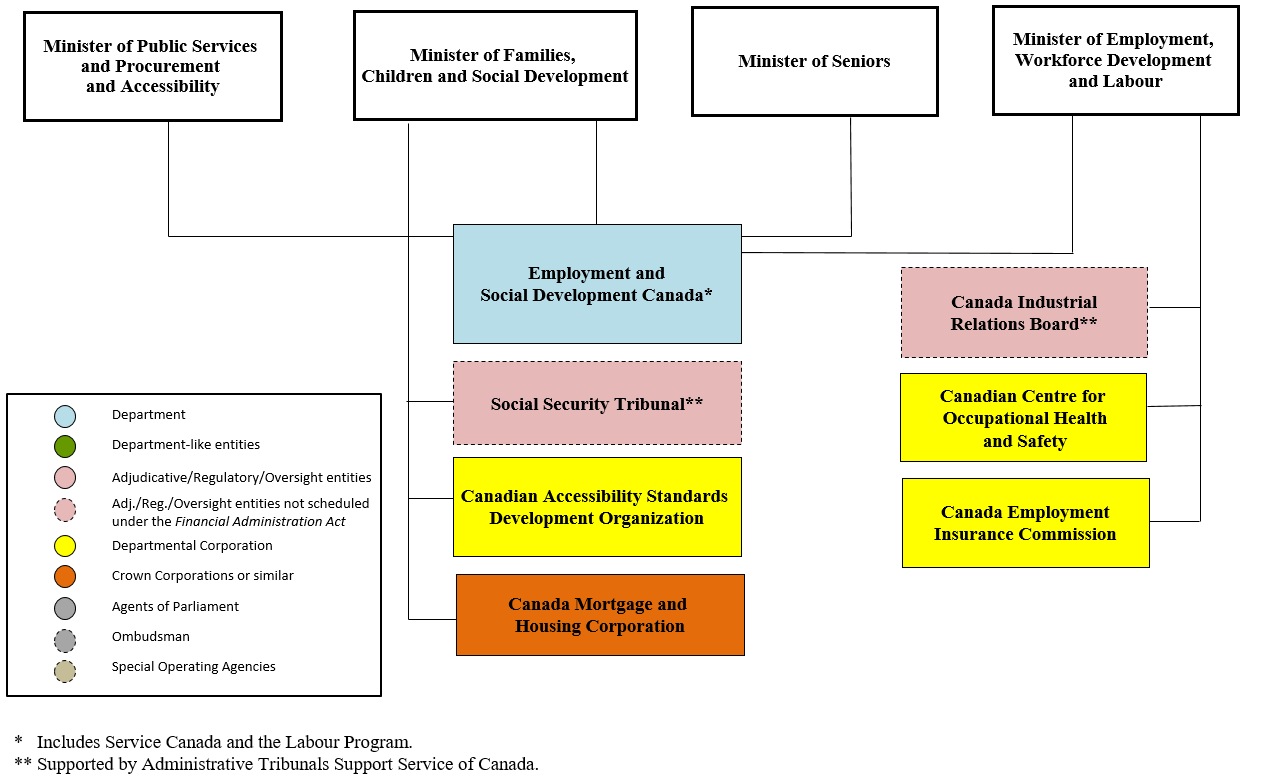
*Includes Service Canada and the Labour Program
**Supported by the Administrative Tribunal Support Service of Canada
To protect the environment, conserve the country’s natural heritage, and reduce potential adverse environmental impacts through the coordination and administration of the Government’s environmental policies and programs, quality and pollution control standards, environmental and meteorological information, as well as the administration of impact assessments of major projects.
Overview: The Portfolio plays a leading role in a number of key areas: the Department of the Environment (currently styled Environment and Climate Change Canada) provides critical services to Canadians, including weather forecasts and warnings, and has significant scientific capacity. The Department also leads on complex, high-profile files such as climate change and biodiversity; Parks Canada Agency maintains a valuable portfolio of parks and historic sites; and the Impact Assessment Agency of Canada is responsible for providing high‑quality impact assessments in support of federal decisions regarding major resource projects. Given shared jurisdiction, provinces and territories play a key role in achieving environmental objectives. Indigenous peoples play a key role given their unique perspectives, knowledge, rights and responsibilities.
Major Challenges and Pressures: Climate change and biodiversity are complex, multifaceted and prominent issues with domestic and international profile. Environmental issues are often deeply interconnected with economic opportunities, as well as social and health issues. [ * ]

Christine Hogan was appointed Deputy Minister of Environment and Climate Change, on September 30, 2019.
Prior to her appointment, Ms. Hogan served as Executive Director for Canada, Ireland and the Caribbean, at the World Bank Group (in Washington), from November 2016 to September 2019. From January 2015 to October 2016, Ms. Hogan was Deputy Minister of International Trade.
Between 2010 and 2015, Ms. Hogan served in the Privy Council Office, where she was initially the Assistant Secretary to the Cabinet and then Foreign and Defence Policy Advisor to the Prime Minister.
Throughout her career of more than 30 years, Ms. Hogan has contributed to a diverse set of public-policy issues ranging from international relations and development to trade policy, science and technology, and environment and energy. She has held a variety of positions within the Government of Canada, including Vice President of Strategic Policy and Performance at the Canadian International Development Agency (now Global Affairs Canada) and Director of International Affairs at Environment Canada.
Ms. Hogan has also been a visiting executive with Encana and an Advisor to the Executive Director of the United Nations Environment Programme, in Nairobi, Kenya.
She holds a Bachelor of Public Administration (Honours) from Carleton University and is a Yale University World Fellow.

Martine Dubuc was appointed Associate Deputy Minister of Environment and Climate Change Canada on January 23, 2017.
Prior to her appointment, Dr. Dubuc served as Vice President of the Science Branch and Canada's Chief Food Safety Officer at the Canadian Food Inspection Agency (CFIA) from 2012 to 2016. In May 2015, Dr. Dubuc was re-elected as Secretary General for the World Organization for Animal Health (OIE) Regional Commission for the Americas and is currently a member of the Animal Production Working Group. She was appointed the Government of Canada Delegate to the OIE in April 2013.
Previously, she worked at senior levels in the Quebec government with responsibilities for the animal health and food safety system at the provincial level. She was also actively engaged in national food safety efforts as part of the Federal/Provincial/Territorial Assistant Deputy Ministers group.
Dr. Dubuc holds a doctorate of veterinary medicine from the Université de Montréal .
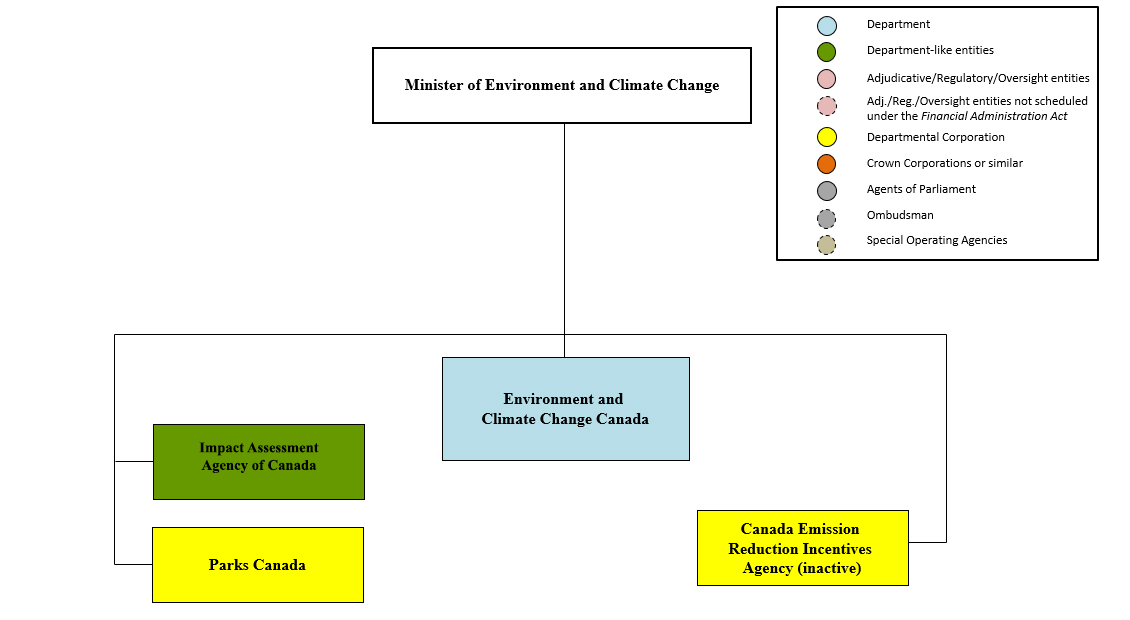
To develop and implement policy and program advice to the Minister of Finance, Cabinet, and other departments and agencies to meet four priorities: 1. Sound fiscal management; 2. Strong, inclusive and sustainable growth; 3. Sound social policy; and 4. Effective international engagement.
Overview: The Department of Finance is responsible for developing the government’s fiscal framework and preparing the federal budget, developing tax and tariff policy and legislation, managing federal borrowing, administering major transfers of federal funds to the provinces and territories, developing regulatory policy for the country’s financial sector, and representing Canada in international and economic and financial forums. The Department also plays a key challenge role on proposals flowing to Cabinet with respect to their fiscal and economic implications, policy alignment and value for money.
The Minister of Finance has overall responsibility for Canada’s financial sector. The Portfolio includes well-established financial sector agencies with clear mandates, which are central to the prudent oversight and management of risk in Canada’s financial sector. The Bank of Canada, Office of the Superintendent of Financial Institutions, Canada Deposit Insurance Corporation, and Financial Consumer Agency of Canada form a strong financial sector policy and coordination framework.
The Minister of Finance is also responsible for major transfers to provincial and territorial governments (which will total $78.7 billion in 2019-20).
The Minister sponsors new funding requests from the Office of the Auditor General.
Challenges: Canada’s financial sector framework has proven to be stable and resilient over time, but must respond effectively to a changing landscape, including shifting technological, macroeconomic and demographic realties.
Within the Finance Portfolio, a number of agencies are at strategic junctures. The Financial Consumer Agency of Canada is entering an expansion period and the Financial Transactions and Reports Analysis Centre of Canada is responding to the growth and sophistication of financial crime, and Payments Canada is responding to innovations in Canada’s payments ecosystem.
The 2018 acquisition of the Trans Mountain Corporation and its entities has increased the public profile of the Canada Development Investment Corporation. In June 2019, the Government approved the Trans Mountain Expansion Project (TMX), and discussions with Indigenous communities on economic participation are ongoing. There will be many significant decision points going forward.
The current rules-based international order is facing a number of challenges that could impact the strength and stability of the global economy and the international monetary system. The Minister of Finance has responsibilities in a number of international organizations and fora (e.g., International Monetary Fund, World Bank, G7) dealing with a range of economic issues.

Paul Rochon was appointed Deputy Minister of Finance on April 21, 2014.
Prior to this appointment, from July 2013 to April 2014, Mr. Rochon served as Deputy Minister of International Development, under the new Department of Foreign Affairs, Trade and Development.
Previously, Mr. Rochon was Associate Deputy Minister of Health and concurrently Special Advisor to the Minister of Finance on negotiations for a Canadian securities regulator.
Mr. Rochon has more than 20 years of experience at the Department of Finance and held a number of positions, including Associate Deputy Minister of Finance and Canada's Finance Deputy at the G-7, G-20 and the Financial Stability Forum, as well as Senior Assistant Deputy Minister in the Economic and Fiscal Policy Branch.
Prior to joining the Department of Finance, Mr. Rochon worked for three years at the Conference Board of Canada.
He holds a Bachelor's degree in History from McGill University and a Master's degree in Economics from the University of Toronto.

Rob Stewart was appointed Associate Deputy Minister of Finance with G7 and G20 responsibilities on October 24, 2016.
Prior to his appointment, Mr. Stewart was Assistant Deputy Minister of the Financial Sector Policy Branch since June 2014.
He has been a public servant in the Department of Finance since 1993. He started in the International Trade and Finance Branch, held a number of positions in the Financial Sector Policy Branch, and was subsequently appointed Assistant Deputy Minister of the International Trade and Finance Branch in August 2010. Before joining the Department of Finance, Mr. Stewart worked at Export Development Canada and in the Canadian sport system.
He holds a BA from Carleton University and an MBA from the University of Ottawa.

Ava Yaskiel was appointed Associate Deputy Minister of Finance on February 5, 2018.
Prior to her appointment, Ms. Yaskiel was Global Head of Corporate, Mergers and Acquisitions and Securities for Norton Rose Fulbright since 2014.
Prior to joining Norton Rose Fulbright’s Toronto office, Ms. Yaskiel spent over five years with the Ontario Securities Commission, holding a variety of positions including senior legal counsel in the Office of the General Counsel, where she focused on mergers and acquisitions, related-party transactions and related policy matters.
She holds a Master of Laws from Cambridge University and a Bachelor of Laws from Osgoode Hall Law School.

*Supported by the Administrative Tribunal Support Service of Canada
To safeguard our waters and manage Canada’s fisheries, oceans, and freshwater resources.
Fisheries: Global demand for fish and seafood products is increasing. Canada has one of the world’s most valuable commercial fishing industries (directly contributes $3.6B to Gross Domestic Product), and is highly export-oriented (exports valued at $6.6B).
Blue Economy: Global economic activity in and around the oceans, including the Arctic, is expanding rapidly and the demand for marine trade/shipping and its contribution to the Canadian economy are expected to grow.
Marine conservation and species at risk: Significant pressure to protect and recover iconic species (salmon, Southern Resident Killer Whale, North Atlantic Right Whale) and their critical habitat, including in regions of important economic activity (Salish Sea, Gulf of St. Lawrence).
Indigenous communities: Increasing access to the resources; autonomy in fisheries activities; and increase partnerships in the management and protection of marine environments. [ * ]
Aquaculture: Canadian production has grown 25 per cent in the past decade. Environmental impacts on surrounding ecosystems are being increasingly scrutinized by the public, particularly the impacts on wild salmon populations.
Diverse and widespread: Over 74 per cent of DFO’s total workforce (approx. 13,000 employees) is located outside of the National Capital Region, at approximately 400 locations across the country. The Department is among the top three custodial departments, operating and maintaining a large, complex and geographically dispersed real property portfolio, with replacement value in excess of $6.4B, and is often the only federal presence in many small coastal communities.
Canadian Coast Guard: Addressing urgent capability needs through implementation of partial fleet renewal, procurement of program icebreakers, [ * ].
Freshwater Fish Marketing Corporation: Continues to face increasing competition and lower profits. The Ministerial Advisory Panel on the Freshwater Fish Marketing Corporation recommended in June 2019 that the possibility of transforming the Freshwater Fish Marketing Corporation into a harvester-led entity continue to be assessed.

Timothy Sargent was appointed Deputy Minister of Fisheries and Oceans on January 7, 2019.
Before this appointment, Mr. Sargent was the Deputy Minister of International Trade since 2016. Prior to joining Global Affairs Canada, Mr. Sargent was an Associate Deputy Minister at Finance Canada and the department’s senior representative to the G7, the G20 and to the Financial Stability Board of the G20, between November 2014 and October 2016. Before working with Finance Canada, Mr. Sargent served as Associate Deputy Minister at Agriculture and Agri-Food Canada.
Previously, Mr. Sargent worked at the Privy Council Office for five years where he was responsible for advising the Prime Minister on range of economic and social issues, and was Assistant Secretary to several Cabinet committees. Before moving to Privy Council Office, Mr. Sargent held various positions in Finance Canada in the areas of macroeconomics and financial markets.
He has a B.A. in Economics and Econometrics from the University of Manchester, a Master's degree in Economics from Western University and a Ph.D. in Economics from the University of British Columbia.
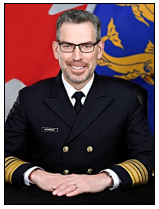
Jeffery Hutchinson was appointed Commissioner of the Canadian Coast Guard on March 13, 2017.
Prior to this appointment, Mr. Hutchinson was the Deputy Commissioner of Strategy and Shipbuilding at the Canadian Coast Guard. He has also held the position of Director General of National Strategies and Director General of Integrated Business Management Services both at the Canadian Coast Guard.
Before joining the Canadian Coast Guard, Mr. Hutchinson was Executive Director at the Treasury Board Secretariat from 2010-2013. Prior to this, he held various positions with Indian Residential Schools Resolution Canada including Executive Director of Indian Residential Schools Adjudication Secretariat (2008-2010) and General Counsel of Legal Services (2005-2006). He was also the General Counsel for the Resolution Branch at Justice Canada (2006-2008).
Mr. Hutchinson has a Bachelor of Law from the University of Western Ontario.

To define, advance and represent Canada’s interests and values abroad through the development and implementation of policy, programs and services related to: international law and diplomacy; peace and security; poverty reduction and humanitarian action; and consular services for Canadians abroad contributing to their safety and security.
Overview: The Department’s core functions include: providing consular services for Canadians; developing and implementing foreign policy, including as it relates to international peace and security, trade, investment and commerce, international development and bilateral diplomatic relations; fostering the development of international law; providing international assistance (encompassing humanitarian, development, and peace and security); managing and leading Canada’s engagement with multilateral and plurilateral institutions and international organizations; and, overseeing the Government of Canada’s global network of 178 missions abroad. There are several arms-length federal entities reporting to Parliament through Global Affairs Canada ministers.
CUSMA: GAC is responsible for coordinating legislative and regulatory amendments required for the implementation of the Canada-United States-Mexico Agreement (CUSMA). CUSMA implementation legislation will need to be tabled in Parliament. [ * ]
World Trade Organization Litigation: Canada is a defending party in two World Trade Organization disputes: Brazil’s challenge to Canadian financial support to the Bombardier C-series; and, second, Australia’s challenge to various federal and provincial wine programs. Decisions are not expected in either dispute until at least mid to late 2020. There are also nine active investor-state arbitration cases. Of these, two awards are expected in late 2019 or early 2020.
Legal Issues: Important ongoing cases include, among others: the extradition request by the United States of Wangzhou Meng, Chief Financial Officer of Chinese telecom company, Huawei; a claim by Employees of GAC and their families for damage resulting from their posting to the Canadian Embassy in Havana, Cuba; and, an action for damages arising from Abousfian Abdelrazak’s arrest, detention and alleged torture in Sudan and alleged failure of the Crown to facilitate his return to Canada (2004-2009).

Marta Morgan was appointed Deputy Minister of Foreign Affairs on May 6, 2019.
Prior to her appointment, Ms. Morgan was Deputy Minister of Immigration, Refugees and Citizenship Canada from 2016 to 2019. Before that, she was Associate Deputy Minister of Finance since August 2014. She served as Assistant Deputy Minister of the Industry Sector (2011-2012), and Assistant Deputy Minister of Strategic Policy Sector (2009-2011) at Industry Canada.
Ms. Morgan has also held positions at the Forest Products Association of Canada, the Privy Council Office, and Human Resources Development Canada.
Ms. Morgan has a Bachelor of Arts (Honours) in Economics from McGill University and a Master’s degree in Public Policy from the John F. Kennedy School of Government at Harvard University.

Vincent Rigby was appointed Associate Deputy Minister of Foreign Affairs on August 12, 2019.
Prior to this, Mr. Rigby served as Associate Deputy Minister of Public Safety since 2017. Before that, he was Assistant Deputy Minister for Strategic Policy at Global Affairs Canada for four years. From 2010 to 2013, Mr. Rigby was Vice-President, Strategic Policy and Performance Branch, at the Canadian International Development Agency. Mr. Rigby has held increasingly senior positions in the Public Service in departments including National Defence and the Privy Council Office.
Mr. Rigby holds a Master of Arts in Diplomatic and Military History and a Bachelor of Arts in History, both from Carleton University.
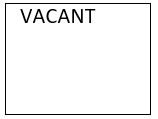
Deputy Minister of International Development

John Hannaford was appointed Deputy Minister of International Trade effective January 7, 2019.
Prior to his appointment, Mr. Hannaford was Foreign and Defence Policy Advisor to the Prime Minister since January 2017. Before that he was the Assistant Secretary to the Cabinet of Foreign and Defence Policy at the Privy Council Office.
Mr. Hannaford also served as the Ambassador to the Kingdom of Norway; Director General and Deputy Legal Advisor of the Legal Bureau at the former Foreign Affairs and International Trade Canada; and Director for the Human Rights and Economic Law Division at the former Foreign Affairs and International Trade Canada.
Mr. Hannaford holds a Bachelor of Arts in History from Queen’s University, a Masters in International Relations from the London School of Economics and a Bachelor of Law from the University of Toronto.

Jonathan Fried was appointed Coordinator of International Economic Relations on April 18, 2017.
Prior to his appointment, Mr. Fried was Ambassador and Permanent Representative of Canada to the World Trade Organization (WTO) in Geneva. He was also the former Ambassador of Canada to Japan; Executive Director for Canada, Ireland and the Caribbean at the International Monetary Fund; Senior Foreign Policy Advisor to the Prime Minister and Head of the Canada-United States Secretariat at the Privy Council Office; and Senior Assistant Deputy Minister and Canadian Representative for the G-7 at the Department of Finance.
Mr. Fried has also held various positions with the former Department of Foreign Affairs and International Trade, as Associate Deputy Minister of Foreign Affairs and International Trade; Assistant Deputy Minister of Trade, Economic and Environmental Policy; Chief Negotiator on the accession of China to the WTO; Director General of the General Trade Policy Bureau and Coordinator for the North American Free Trade Agreement; and Principal Legal Counsel for the office of North American Free Trade Negotiations.
Mr. Fried holds a Bachelor of Arts in Philosophy, a Bachelor of Law from the University of Toronto, and a Master of Law from Columbia University.

To help Canadians maintain and improve their health by: supporting a strong Canadian health care system; providing regulatory oversight of consumer and health products, food, drugs and drug prices, and cannabis to help protect health and safety; preventing chronic and infectious diseases; maintaining public health emergency preparedness and responses; and, supporting health policy, programs, and research findings to improve health and health care.
Overview: The Health Portfolio is comprised of five science-based organizations, and plays a leadership role, working with provinces and territories, to advance health care system improvements and administer the Canada Health Act. The Health Portfolio is also responsible for: regulating and enforcing standards for thousands of products and substances that have a direct impact on the health and safety of Canadians; preparing for and responding to public health threats/emergencies; and, reducing health inequalities, promoting healthy development, and the prevention and control of chronic and infectious diseases.
Health care systems: The Health Portfolio continues oversight and enforcement of the Canada Health Act and management of bilateral agreements with provinces and territories on home and community care and mental health and addiction. Pharmaceutical policy and management issues continue to improve access and affordability, including efforts on: drug shortages; the implementation of the patented medicines regulations; and, the possibility of bulk U.S. drug imports. A legislative review of the Medical Assistance in Dying Act begins in 2020, and there is ongoing litigation on the file.
Regulatory regimes: The Health Portfolio’s regulatory approaches to protect the health and safety of Canadians for a diverse array of consumer and therapeutic products and substances continue to evolve to be sustainable and to effectively respond to factors altering Canada’s regulatory environment, including: the rapid pace of product innovation; the shift from domestic to global supply chains; the proliferation of readily accessible health information; and, the implementation of new regulatory regimes, such as cannabis, including for new classes of cannabis products (edibles, extracts and topicals), which came into force October 17, 2019.
Public health threats, research and promotion: The Health Portfolio prepares, and responds to global and domestic health threats or emergencies, such as antimicrobial resistance and the opioid crisis, and prevents and controls the spread of infectious disease. The Health Portfolio also strengthens Canada’s public health system by supporting the development of data, evidence, and research, and helps to address impacts of an aging population and rates of chronic disease through efforts aimed at Canadians’ physical and mental health.

Stephen Lucas was appointed Deputy Minister of Health on September 3, 2019.
Prior to this appointment, he was Deputy Minister of Environment and Climate Change (2017-2019). Before that, he served as Senior Associate Deputy Minister (Climate Change) of Environment and Climate Change Canada since June 2016.
Previously, Dr. Lucas was Deputy Secretary to the Cabinet (Plans and Consultations and Intergovernmental Affairs) within the Privy Council Office, since July 2014. Dr. Lucas was Assistant Secretary, Economic and Regional Development Policy at Privy Council Office from 2013-2014.
As Assistant Deputy Minister, Science and Policy Integration at Natural Resources Canada from 2009 to 2013, he was responsible for strategic policy development related to energy, mineral and forest resources, international and intergovernmental relations, and supporting departmental planning and evaluation. Prior to that, he was Assistant Deputy Minister, Minerals and Metals Sector at Natural Resources Canada from 2007-2009, where he provided leadership, in particular, on innovation, green mining and corporate social responsibility.
Dr. Lucas started his career as a research scientist at the Geological Survey of Canada in late 1988.
He has a Bachelor of Science with Honours in Geological Engineering (Gold Medalist) from Queen's University and a Ph.D. in Structural Geology and Tectonics from Brown University.

Note: The activities of the Canadian Food Inspection Agency fall under the shared responsibilities of the Minister of Health and the Minister of Agriculture and Agri-Food. The Minister of Health is responsible for the overall management of the Canadian Food Inspection Agency, including its appropriations and reports to Parliament, as well as food safety. The Minister of Agriculture and Agri-Food is resposible for plant and animal health, market access and non-food safety-related food labelling.
To advance policies, programs, and services to select and welcome newcomers, as permanent and temporary residents, to settle and fully integrate into Canadian society and contribute to Canada’s prosperity; to comply with international and domestic laws to protect refugees and people in need of protection; to promote the rights and responsibilities of Canadian citizenship; and, to issue Canadian passports to citizens.
Overview: Immigration contributes to Canada’s economic, social, and cultural enrichment and plays a vital role in sustaining Canada’s population to support labour force growth. Immigration is a shared federal, provincial/territorial responsibility and Immigration, Refugees and Citizenship Canada engages provincial/territorial partners, and businesses that look to immigration to address labour needs, attract new skills, and compete globally. Immigration, Refugees and Citizenship Canada also engages with the international community to address migration and collaborate on joint initiatives related to the movement of people. Recent issues raised by stakeholders include matching skilled workers with employers and regional labour shortages.
Managed migration: Immigration, Refugees and Citizenship Canada manages migration volumes by setting targets and controlling intake to Canada of foreign nationals that help achieve a pace, and mix, of immigration that best contributes to enriching Canada’s prosperity. To help manage volumes, work continues towards end-to-end electronic applications and streamlining processes through a broad transformation agenda, including reviewing legacy IT system issues and asylum reform measures to meet international legal obligations, discourage misuse of the system, and to maintain system integrity.
Unprecedented levels of asylum claims: Global migration has reached a historic peak with 258 million people on the move, and Canada has seen unprecedented levels of asylum claims that have created pressures across Canada’s asylum system. Over the last 24 months, Canada has experienced its highest volume of asylum claims (50,000 in 2017, 55,000 in 2018, and high volumes are expected for 2019). The overall increase in the number of asylum claims in Canada has downstream impacts on the federal government to provide services such as interim healthcare, and on provinces for social services, including housing and education.
Since 2017, the surge in irregular migrants, particularly in Lacolle , Quebec, and to a lesser extent in Manitoba and British Columbia, point to changing patterns and demographics, and the need to work with the United States in different ways.

Catrina Tapley was appointed Deputy Minister of Immigration, Refugees and Citizenship Canada on August 19, 2019.
Prior to this appointment, Ms. Tapley was Deputy Secretary to the Cabinet (Operations) (2017-2019) and Assistant Secretary to the Cabinet of Economic and Regional Development Policy (2016-2017) within the Privy Council Office. She also held the positions of Assistant Deputy Minister (2014-2016) and Associate Assistant Deputy Minister (2010-2014) for Strategic and Program Policy at the former Citizenship and Immigration Canada.
Ms. Tapley held numerous Executive Director positions at the Treasury Board of Canada Secretariat (2006-2010).
Ms. Tapley holds a Bachelor of Arts in Political Science and Economics from Acadia University.

Lori MacDonald was appointed Associate Deputy Minister of Immigration, Refugees and Citizenship Canada on August 29, 2018.
Prior to this appointment, Ms. MacDonald was Assistant Deputy Minister, Safety and Security at Transport Canada.
Between 2015 and 2017, she was Assistant Deputy Minister, Emergency Management and Programs Branch at Public Safety Canada.
Before that she occupied many senior level positions within Correctional Service of Canada.
Ms. MacDonald holds a Diploma in Law and Security Administration from Loyalist College and a Bachelor of Arts in Criminology and Criminal Justice from Carleton University.

To work with First Nations, Inuit, and Métis to improve access to high quality services, improve well-being in Indigenous communities across Canada, and support Indigenous peoples in assuming control of the delivery of services at the pace and in the ways they choose.
Overview: Indigenous Services Canada is focused on the delivery of services to Indigenous communities and individuals while fostering positive relationships with, and building up the capacity of, Indigenous partners to increase their control over the design and delivery of services in a wide range of areas. These include: education, health, economic development, emergency management, and infrastructure. Indigenous Services Canada’s five key priority areas are: keeping children and families together; improving health outcomes; quality education; reliable infrastructure; and, economic prosperity.
Socio-economic gaps: The socio-economic gaps between Indigenous and other Canadians are significant. Indigenous peoples have lower socio-economic and health status (e.g., lower labour force rate, higher rates of infectious and chronic disease, lower life expectancy, flooding and water quality issues) and major challenges in basic living conditions (e.g., water, infrastructure, housing) when compared to the general population.
Canadian Human Rights Tribunal: Since 2016, continued Canadian Human Rights Tribunal decisions related to the First Nations Child and Family Services Program and Jordan’s Principle Initiative have ordered Canada to increase funding in order to address systemic underfunding. [ * ]

Jean-François Tremblay was appointed Deputy Minister of Indigenous Services on September 25, 2017.
Prior to this appointment Mr. Tremblay served as Deputy Minister of Infrastructure since March 2016. Mr. Tremblay was also Deputy Minister of Transport, Infrastructure and Communities (TIC) from July 2015 to March 2016.
Before joining the TIC portfolio, Mr. Tremblay was Deputy Secretary to the Cabinet (Operations), Privy Council Office, since April 2013.
Previously, he was with Aboriginal Affairs and Northern Development Canada, where he held the position of Senior Assistant Deputy Minister, Treaties and Aboriginal Government, from 2012 to 2013, and Senior Assistant Deputy Minister, Policy and Strategic Direction from 2010 to 2012.
Before joining Aboriginal Affairs and Northern Development, Mr. Tremblay worked with the Privy Council Office, serving as Assistant Secretary to the Cabinet, Priorities and Planning, from 2007 to 2010.
Between 2006 and 2007, he worked in the Intergovernmental Affairs Secretariat, where he held the positions of Director General, Sectoral Analysis, followed by Assistant Deputy Minister, Intergovernmental Operations.
Between 2003 and 2006, Mr. Tremblay held several positions at Health Canada, including Director General of Policy Coordination and Planning in the Health Care Policy Directorate; and Executive Director of Health System Development, Strategic Policy, Planning and Analysis Directorate, in the First Nations and Inuit Health Branch.
Mr. Tremblay joined the Federal Public Service in 2000 as a policy analyst with the Privy Council Office, holding a variety of responsibilities with Intergovernmental Affairs and the Social Development Policy Secretariat.
Mr. Tremblay holds a Ph.D. in Political Science from Université Laval .

Sony Perron was appointed Associate Deputy Minister of Indigenous Services on December 18, 2017.
Prior to his appointment, Mr. Perron was Senior Assistant Deputy Minister, First Nations and Inuit Health Branch at Health Canada since 2014.
Mr. Perron worked for Health Canada for more than 15 years where he was Assistant Deputy Minister, Corporate Services Branch (2012-2014); Director General, Corporate Planning (2011-2012); and Director General, Non-Insured Health Benefits Directorate (2010-2011).
He holds a Master of Public Administration from l’École nationale d’administration publique and a Bachelor of Urban Planning from the Université du Québec à Montréal .

To work closely with all orders of government and other partners to enable investments in public infrastructure projects.
Overview: The department administers programming to deliver on specific goals of the government (e.g., Disaster Mitigation and Adaptation Fund and the Smart Cities Challenge). In addition, the portfolio takes the lead in coordinating and reporting on infrastructure‑related programming across government (touching on social, housing, broadband, on reserve, and many other areas of programming in other departments).
Investing in Canada Infrastructure Program: This program delivers $33.1 billion in funding to provinces and territories by means of 10-year Integrated Bilateral Agreements. [ * ]
Gas Tax Fund - Provides a statutory mechanism for transferring funds to municipalities and First Nations with minimal conditionality. Top-ups to this fund are a perennial request.
Canada Infrastructure Bank: A new Crown corporation mandated to advance a different type of partnership model to help more projects get built. The Canada Infrastructure Bank is in its second full year of operations and is implementing its business lines and building a pipeline of potentially investable projects.
Major Bridge Projects: The Samuel de Champlain Bridge connects the south shore to Montreal, and is a key trade corridor for Canada. The Gordie Howe International Bridge, currently under construction, will provide much needed redundancy at Canada’s busiest surface trade corridor with the United States.
Rural Economic Development Strategy: Has raised stakeholder expectations for an enhanced federal focus on rural issues. Implementation requires extensive interdepartmental coordination and engagement, notably with Regional Development Agencies for community development and Innovation, Science and Economic Development for advancing rural broadband.

Kelly Gillis was appointed Deputy Minister of Infrastructure on September 25, 2017.
Prior to this appointment, Ms. Gillis served as Associate Deputy Minister at Innovation, Science and Economic Development Canada (ISED) since 2015. Previously, Ms. Gillis served as Senior Assistant Deputy Minister, Spectrum, Information Technologies and Telecommunications (SITT) Sector at Industry Canada.
Ms. Gillis has also held the position of Assistant Deputy Minister, SITT, where she focused on policies that supported Canada's information and communications technology industry and advanced the digital economy.
From September 2009 to March 2012, Ms. Gillis was Industry Canada's Chief Financial Officer. In this role, she was responsible for providing financial oversight, advice and corporate services. Prior to joining Industry Canada, she was the Assistant Secretary and Chief Financial Officer, Corporate Services Sector, at the Treasury Board of Canada Secretariat, where she led the creation of the new Corporate Services Sector.
Ms. Gillis was also the Executive Director and Deputy CFO at the Department of Finance Canada. Ms. Gillis holds a Bachelor of Commerce and Graduate Diploma in Public Accounting from McGill University and is also a qualified chartered accountant.

To promote a growing knowledge-based economy by improving Canada’s innovation performance, increasing Canada’s share of global trade, improving conditions for investment, making firms more productive and competitive, and building an efficient and competitive marketplace that instills consumer and business confidence.
Overview: The expanded Innovation, Science and Economic Development Canada (ISED) portfolio includes multiple departments and agencies to support a broad economic mandate, including direct support to industry through grants and contributions to support innovation, fundamental science research and economic development.
Streamlining: The portfolio has undergone significant program streamlining and re-alignment of federal innovation programming in the past several years to make it easier for businesses to access support, implementing an ecosystem approach utilizing all of the portfolio partners and the International Trade Commissioner Service (Global Affairs Canada) to improve competitiveness outcomes.
Competitiveness: Globally, Canada’s international ranking on key competitiveness and productivity measures remain a challenge which the program changes are intended to address. Sufficient time must be given for businesses to adapt to the new changes and for new partnerships and models to demonstrate return on investment. Significant new investments in fundamental science and research will take years to have an impact.
Digital: The digital economy is disrupting traditional economic sectors and reshaping global value chains. Canada must address key challenges to adapt and thrive in the digital economy, including our marketplace frameworks, regulatory environment, skills and technology adoption for Canadian firms.

Simon Kennedy was appointed Deputy Minister of Innovation, Science and Economic Development on September 3, 2019.
Previously, he served as Deputy Minister of Health. Before that, he served as the Deputy Minister of International Trade and Canada's G-20 Sherpa. He oversaw the Trade Portfolio through one of the most productive periods in the history of Canadian trade negotiations.
Prior to his assignment at International Trade, Mr. Kennedy served as the Senior Associate Deputy Minister at Industry Canada from 2010 to 2012. For almost a year during this period, Mr. Kennedy was also the Prime Minister's representative on the Canada-U.S. Beyond the Border Working Group. In this role, he led the negotiation with the White House of the Canada-U.S. Action Plan for Perimeter Security and Economic Competitiveness, announced by the Prime Minister and President Obama in December 2011.
Mr. Kennedy began his career with the Public Service in 1990, serving in a variety of progressively senior roles at Transport Canada, the Canadian Coast Guard, and Agriculture and Agri-Food Canada. He also held several senior positions at the Privy Council Office, in the 1990s and 2000s. These most recently included two deputy-level appointments: Deputy Secretary to the Cabinet for Operations from 2008 to 2010 and Deputy Secretary to the Cabinet for Plans and Consultation from 2007 to 2008.
Mr. Kennedy began his career with the Public Service in 1990, serving in a variety of progressively senior roles at Transport Canada, the Canadian Coast Guard, and Agriculture and Agri-Food Canada. He also held several senior positions at the Privy Council Office, in the 1990s and 2000s. These most recently included two deputy-level appointments: Deputy Secretary to the Cabinet for Operations from 2008 to 2010 and Deputy Secretary to the Cabinet for Plans and Consultation from 2007 to 2008.

Paul Thompson was appointed Associate Deputy Minister of Innovation, Science and Economic Development effective November 20, 2017.
Prior to his appointment, Mr. Thompson served as Senior Assistant Deputy Minister of Skills and Employment at Employment and Social Development Canada (2014-2017), and prior to that he was the Assistant Deputy Minister, responsible for the Processing and Payment Services Branch (2010-2014).
He was Senior Assistant Deputy Minister, Skills and Employment Branch, Employment and Social Development Canada (2007-2009) and Executive Director, Strategic Planning, Corporate Priorities and Planning, Treasury Board Secretariat (2005‑2007).
He served as Director of Operations, Social Development Policy, Privy Council Office (2004-2006) and Director General, Departmental Assessment and Alignment Project, Fisheries and Oceans Canada (2003-2004).
Prior to this, Mr. Thompson was Director General, Strategic Priorities and Planning, Policy Sector, Fisheries and Oceans Canada (2000-2002).
Mr. Thompson holds a Bachelor of Arts in Economics from the University of Toronto and a Master of Arts in Economics from Queen’s University.

Paula Isaak was appointed President of the Canadian Northern Economic Development Agency, on October 9, 2018.
Prior to this appointment, Ms. Isaak was Assistant Deputy Minister, Education and Social Development Programs and Partnerships at Indigenous Services Canada. From 2007 and 2015, she held two Director General positions at Indigenous and Northern Affairs Canada - one with the Natural Resources and Environment Branch and one as a Regional Director General for the Yukon.
Ms. Isaak has a Bachelor of Political Science from the University of Manitoba and a Master of Public Administration from Carleton University.
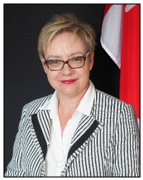
Manon Brassard was appointed President of the Economic Development Agency of Canada for the Regions of Quebec, effective June 27, 2016.
Prior to her appointment, Ms. Brassard was Assistant Deputy Minister, Compensation and Labour Relations at the Treasury Board Secretariat since February 2014. She previously served as Assistant Deputy Minister of Programs at Agriculture and Agri-Food Canada (2013-2014) and Assistant Deputy Minister of Corporate Services with Citizenship and Immigration Canada (2010-2013).
Before joining Citizenship and Immigration, Mr. Brassard held executive positions with the Economic Development Agency of Canada for the Regions of Quebec and the Immigration and Refugee Board.
Ms. Brassard holds a Bachelor of Law from Université Laval .

James Meddings was appointed President of the Federal Economic Development Agency of Southern Ontario on October 31, 2016.
Previous to this appointment, he was Assistant Deputy Minister, Policy and Strategic Orientation at Western Economic Diversification Canada since 2011.
His prior positions include, Vice-President of the Organizational Leadership and Innovation Branch at the Canada School of Public Service (CSPS) and Vice-President of Individual Learning and Special Advisor to the President of the CSPS from 2006 to 2011.
Prior to his arrival at CSPS, Mr. Meddings worked at Environment Canada as Director General, Policy and Corporate Affairs. He has also worked for Human Resources Development Canada, the Privy Council Office and the Canadian Human Rights Commission. Prior to his career in the Public Service, Mr. Meddings taught economics and political science in both public and private schools in the United Kingdom and in Canada.
He holds a Bachelor of Arts (Honours) in Economic and Social Studies from the University of East Anglia, a Post Graduate Certificate in Education from the University of Birmingham and a Master of Arts, Public Policy and Public Administration, Concordia University.

Francis McGuire was appointed President of the Atlantic Canada Opportunity Agency on June 12, 2017.
Prior to his appointment, Mr. McGuire was President and Chief Executive Officer of Major Drilling Group International Inc. (2015-2017). From 1998 to 2000, he was Vice-President of Marketing and Business Development, MIIT Information Technology Inc. Prior to this role he was Deputy Minister for Economic Development and Tourism with the government of New Brunswick (1985-1997).

Anil Arora was appointed Chief Statistician of Canada on September 19, 2016.
Prior to his appointment, Mr. Arora served as the Assistant Deputy Minister of Health Products and Food Branch at Health Canada from 2014-2016. In 2010, Mr. Arora joined Natural Resources Canada as Assistant Deputy Minister of the Minerals and Metals Sector, and in 2013 was appointed Assistant Deputy Minister of Science and Policy Integration.
In 1988, Mr. Arora joined Statistics Canada where he served in several positions, including regional operations, corporate services and the redesign of the dissemination function. In 2000, he became Director of Census Management Office and, subsequently, the Director General responsible for all aspects of the 2006 Census. Following the successful delivery of the 2006 Census he became the Assistant Chief Statistician of Social, Health and Labour Statistics from 2008 to 2010.
Mr. Arora attended the University of Alberta, where he earned a Bachelor of Science.

Dylan Jones was appointed Deputy Minister for Western Economic Diversification on June 20, 2016.
Prior to his appointment, Mr. Jones served as the President and Chief Executive Officer of the Canada West Foundation since June 2012. From 2000 to 2012, he worked for the Government of Saskatchewan where he held various positions, including Deputy Minister of Intergovernmental Relations, Associate Deputy Minister of Intergovernmental Relations, Assistant Deputy Minister of Intergovernmental Relations, Executive Director of Intergovernmental Relations, and Executive Director of Strategic Policy, Recreation and Youth.
Mr. Jones obtained a Bachelor of Arts and Science from McMaster University, a Bachelor of Laws from the University of British Columbia, and a Master of Laws from the University of Oxford.
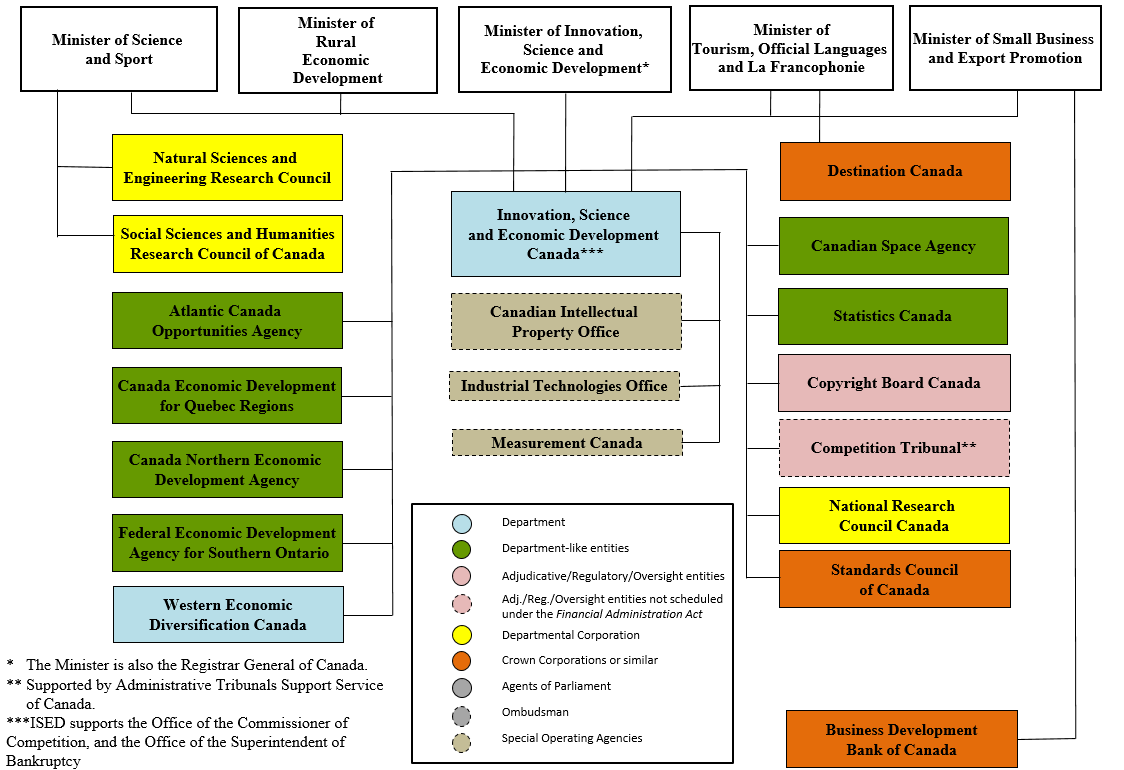
Innovation, Science, and Economic Development portfolio:
*The Minister is also the Registrar General of Canada
**Supported by the Administrative Tribunal Support Service of Canada
***ISED supports the Office of the Commissioner of Competition, and the Office of the Superintendent of Bankruptcy
To support the Minister of Justice in working to ensure that Canada is a just and law-abiding society with an accessible, efficient and fair system of justice; support the Attorney General of Canada (the legal adviser to the Government) by providing high-quality legal services and counsel to all federal departments and agencies; and, promote respect of the law, the Constitution, and the Canadian Charter of Rights and Freedoms.
Overview: Canadians expect an open, transparent, engaged government and legal system – and laws and legal environments must evolve and adapt rapidly to be relevant. Today’s legal environment is challenging, including supporting technology development and support innovation, while respecting privacy and the security of Canadians.
Active legal landscape: There has been a rise in class actions. [ * ] Access to justice continues to be important for Canadians, especially in light of increasing rates of individuals representing themselves without the assistance of a lawyer. Active litigation respecting medical assistance in dying, pipelines, environmental protection and greenhouse gas legislative measures will remain at the forefront. Key court decisions are expected which may require both legislative and litigation responses.
Strained federal legal services: The Government is challenged to provide effective and fiscally sustainable legal services. Legal services are increasingly resource-intensive, given the complexity of the work (implicating several departments and involving crosscutting issues), and a high level of demand from client departments, with fluid and shifting priorities and needs. Justice’s Legal Aid Program, particularly immigration and refugee legal aid, is facing on-going pressures due to budget shortfalls and increased demand. There continues to be concerns with respect to delays in accessing justice systems, which can lead to miscarriages of justice and impact victims.
Indigenous over-representation in the justice system. Although Indigenous peoples represent a small fraction of Canada’s adult population (5%), they are overrepresented in the justice system (26% under federal jurisdiction). Indigenous women are particularly overrepresented in the justice system (42% of female admissions under federal jurisdiction).

Nathalie G. Drouin was appointed Deputy Minister of Justice on June 26, 2017.
Prior to this, Ms. Drouin served as Senior Associate Deputy Minister of Justice and before joining the Federal Public Service, Ms. Drouin served as Deputy Minister of Justice and Deputy Attorney General with the gouvernement du Québec since September 2012. Ms. Drouin also served in several positions with Autorité des marchés financiers such as Superintendent of Solvency Supervision and Director General of Legal Affairs (2012) and Director General of Market Supervision and Legal Affairs (2004-2012).
Before this, Ms. Drouin worked in Loan Services with the Transition Office of the Financial Sector (2003-2004), was the Director of Legal Affairs with the Office of Financial Services (1999-2003), and Director of Legal affairs with the Board of Health Insurance (1996-1998).
Ms. Drouin holds both a Bachelor of Law degree and a Graduate Diploma in Business Administration from the Université Laval.

François Daigle was appointed Associate Deputy Minister of Justice on July 31, 2017.
Previous to this appointment, Mr. Daigle was Assistant Secretary to the Cabinet, Social Development Policy at the Privy Council Office (PCO). In that role, he was responsible for supporting Cabinet on key policy issues related to social affairs. From 2009 to 2012, Mr. Daigle served as an Assistant Deputy Minister among other senior level positions, at the Department of Justice.
Before joining the Public Service, Mr. Daigle worked as a Barrister and Solicitor at Stewart McKelvey Stirling Scales Moncton, in New Brunswick.

* Combined as a single department under the Financial Administration Act
**Supported by the Administrative Tribunal Support Service of Canada
The Department of National Defence (DND) and the Canadian Armed Forces (CAF) provide combat-effective, multi-purpose forces capable of protecting Canada and Canadians at home and abroad, with a military that is ready and able to defend Canadian sovereignty; is active in a renewed defence partnership with the US and NORAD; meets commitments to NATO allies; and contributes to a more stable, peaceful world. Within the DND Portfolio, the Communications Security Establishment (CSE) is Canada’s national cryptologic agency, providing the Government of Canada with information technology security, foreign signals intelligence services and technical and operational assistance to federal law enforcement and security agencies. Housed within CSE, the Canadian Centre for Cyber Security is the single unified source of expert advice, guidance, services and support on cyber security for government, critical infrastructure owners and operations, the private sector and the Canadian public.
Overview: The evolving balance of power across the globe, the changing nature of conflict, and rapidly-evolving technology have increased the urgency of responding to security challenges that were not fully addressed or funded through Canada’s defence policy, Strong, Secure, Engaged.
Emerging priorities include the continental defence program (NORAD modernization and emerging domains, technology and cyber-security issues); threats and challenges that fall below the threshold of conflict (military modernization and expansion, economic-based threats, and foreign influence and interference); and burden-sharing among allies, which impacts on Canada’s defence capability, credibility and relevance with partners.
The portfolio must also address constraints – including the need for procurement, infrastructure, personnel and resources that affect its ability to address these emerging priorities.
CAF capacity: Implementation of initiatives to invest in CAF capability and capacity, as outlined in Canada’s defence policy, Strong, Secure, Engaged, is ongoing. National Defence oversees $33.2B in defence equipment assets, and is undertaking a recapitalization of its core equipment fleets.
Sexual Misconduct: Efforts to address sexual misconduct are continuing through Operation HONOUR and the Sexual Misconduct Response Centre.
Diversity Strategy: There is an increasing emphasis on engagement with ethno-cultural and diverse communities, including representatives from Indigenous communities and organizations focused on gender, diversity and inclusion, to support the CAF’s Diversity Strategy and recruitment.
Communications Security Establishment: The Communications Security Establishment (CSE) is implementing new authorities and adapting to a new legislative environment with the passage of Bill C-59, the Act Respecting National Security Matters, which included the Communications Security Establishment Act.
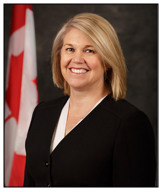
Jody Thomas was appointed Deputy Minister of the Department of National Defence on October 23, 2017.
Prior to this appointment, Ms. Thomas served as Senior Associate Deputy Minister of the Department of National Defence. In 2015, Ms. Thomas was the first woman to be appointed as the Canadian Coast Guard Commissioner. She currently holds a Commission in the Navy (Naval Reserve) and since 1984 has held various positions at sea and in Maritime Command Headquarters. Ms. Thomas began her career in the Federal Public Service in 1988 as Chief, Business Planning and Administration with Public Works Canada in the Atlantic Region. Ms. Thomas then became the Atlantic Regional Business Manager, Architectural and Engineering Services, and Business Manager of the Esquimalt Graving Dock in Vancouver, British Columbia.
Ms. Thomas joined Passport Canada in 1995 at the Victoria Passport Office where she held roles such as Project Director, and Manager of Case Management, Foreign Operations, and then Security Operations. She then became Director, Security Operations and Director General of Security. In 2007, she held the position of Chief Operating Officer of Passport Canada, managing service delivery at 35 locations and with responsibility for 3000 employees across Canada.
In 2010, she joined the Canadian Coast Guard where she held the position of Deputy Commissioner, Operations for four years.
Ms. Thomas holds a Bachelor of Arts from Carleton University.
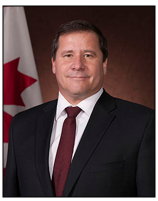
Claude Rochette was appointed Associate Deputy Minister of the Department of National Defence on January 28, 2019.
Mr. Rochette was appointed Assistant Deputy Minister (Finance) and Chief Financial Officer of National Defence in January 2015 and held the position until January 2019.
Prior to accepting this role, Mr. Rochette was the Vice-President, Comptrollership Branch and Chief Financial Officer at the Canada Border Services Agency from June 2012 to January 2015. In addition to being the strategic financial advisor to the President, Mr. Rochette was responsible for overseeing the agency's infrastructure, procurement, contracting, assets and security policies and processes. From 2010 to 2012, Mr. Rochette was the Director General of Finance and Chief Financial Officer at the Communications Security Establishment Canada.
Mr. Rochette joined the Canadian Armed Forces in 1984. He served in a number of senior executive positions including senior auditor, Director General Compensation and Benefits, and Commandant of the Canadian Forces Support Unit (Ottawa).
Mr. Rochette graduated from Université Laval with a Bachelor of Arts in Industrial Relations. He is also a graduate of the Canadian Forces Command and Staff College and the National Strategic Studies Program.

Gordon Venner was appointed Associate Deputy Minister of the Department of National Defence on October 23, 2017.
Prior to this appointment, Mr. Venner was Assistant Deputy Minister for Policy at the Department of National Defence (DND) since 2014. Before joining DND, Mr. Venner had several positions within Global Affairs Canada, where served as Ambassador from 2004-2006, then Director General from 2006-2008 and more recently as Assistant Deputy Minister from 2010 to 2014. Mr. Venner also served as Assistant Secretary to the Cabinet for Policy at the Privy Council Office from 2008-2010.
In addition to this career in the Federal Public Service, Mr. Venner worked both at the municipal and provincial levels. From 1982-1984 he was Special Assistant to the Mayor for the City of North York, and from 1984-1988 he was an Economic Policy Team Leader for the Ministry of Intergovernmental Affairs, Government of Ontario.
Mr. Venner holds a Bachelor of Political Science from the University of Western Ontario and a Master’s Degree from London School of Economics.

Shelly Bruce was appointed Chief, Communications Security Establishment on June 27, 2018.
Prior to this appointment, Ms. Bruce was Associate Chief, Communications Security Establishment. Previously, Ms. Bruce was Deputy Chief SIGINT within the Security and Safety Branch of Communications Security Establishment since 2009. Ms. Bruce also served as Director of Operations at the Privy Council Office from 2007 to 2009 and as Director General of Intelligence at Communications Security Establishment from 2004 to 2007.
Ms. Bruce holds a Master of Arts in Slavic Languages and Literature from the University of Toronto and a Bachelor of Arts in Russian Studies from Dalhousie University.

To administer tax, benefits, related programs, and ensure compliance. On behalf of all provinces and territories, the Canada Revenue Agency (CRA) collects personal income taxes (except Quebec) and corporate income taxes (except Quebec and Alberta). The CRA contributes to the ongoing economic and social wellbeing of Canadians.
Overview: The CRA is one of the federal government’s largest employers with operations in every region of the country. It administers four federal benefit programs: Canada child benefit, GST/HST credit, children’s special allowance, and the disability tax credit. The CRA coordinates with Employment and Social Development Canada the administration of the Canada Pension Plan, Employment Insurance, Guaranteed Income Supplement, and Old Age Security programs.
The CRA is striving to be a world-class tax administrator and modernizing its suite of digital services to make it user focused, secure, and digital from end-to-end.
Challenges: Stakeholders, including the Office of the Auditor General (OAG), have criticized the CRA for providing poor client services. For example, the OAG found that CRA call center agents answer only one out of three phone calls and CRA auditors do not apply tax rules consistently across taxpayers. In 2018, the Government conducted a service review of the CRA and examined its compliance, collection, and client services activities. Based on the review findings, the Agency will reallocate funds internally to improve services.
The CRA is conducting collective bargaining with the Public Service Alliance of Canada. There is potential for labour disruption during the 2020 tax filing season.

Bob Hamilton was appointed Commissioner of Revenue on August 1, 2016.
Mr. Hamilton was Deputy Minister of Natural Resources Canada from July 2014 to July 2016. Prior to this he served as Deputy Minister of the Environment for two years.
His background also includes serving as Senior Associate Secretary of the Treasury Board from March 2011 to July 2012.
Mr. Hamilton has held many senior positions in the Department of Finance, including Senior Assistant Deputy Minister of Tax Policy and the Assistant Deputy Minister of Finance Sector Policy.
Mr. Hamilton has a Bachelor of Arts (Honours) and a Master’s degree in Economics from Western University.

Christine Donoghue was appointed Deputy Commissioner of Revenue on August 29, 2018.
Prior to her appointment, Ms. Donoghue was Associate Deputy Minister of Health. Before that, she held the position of Acting President of the Public Service Commission since February 2015.
She first joined the Federal Public Service in 1984 as a Senior Fisheries Officer at Fisheries and Oceans Canada. She left the Public Service in 1987 to study law and later became a legislative advisor to the Government House Leader of the National Assembly of Quebec. Since 2005, Ms. Donoghue has served in several Assistant Deputy Minister positions at: Natural Resources Canada, Canada School of Public Service, Environment Canada and Policy Horizons Canada. In 2014, she became the Senior Vice-President, Policy at the Public Service Commission.
She has a Bachelor of Law from Université Laval .

To enhance the responsible development and use of Canada’s natural resources and the competitiveness of Canada’s natural resources products by delivering results for Canadians across three core areas of responsibility: globally competitive natural resource sectors; innovative and sustainable natural resources development; and, natural resource science and risk mitigation.
Overview: Canada has the world’s third largest oil reserves and is the fourth largest producer in the world. Canada has the largest forest area per capita among the G20 economies and is one of the largest mining nations in the world. The natural resource sector directly and indirectly contributes more than 17 per cent of national Gross Domestic Product (GDP) and accounts for over 1.7 million jobs. In addition, from 2007 to 2017, GDP of the clean technology sub‑sector grew by 25 per cent in real terms. [ * ]
Energy: Management (e.g., engagement, litigation) of major projects (Trans Mountain Expansion; Manitoba-Minnesota Transmission Line; Line 3; Keystone XL; Gazoduc); charting an energy vision for Canada; and, setting a strategy for investment in battery technologies.
Mining and minerals: Implementing the federal-provincial-territorial Canadian Minerals and Metals Plan and the Canada-US joint action plan on critical minerals.
Trade: Softwood lumber, uranium and other resource-related trade irritants.

Christyne Tremblay was appointed Deputy Minister of Natural Resources Canada on August 1, 2016.
Prior to joining Natural Resources Canada, Ms. Tremblay served as Deputy Minister, Ministère du Développement durable, de l’Environnement et de la Lutte contre les changements climatiques, with the Government of Quebec from January 2015 to July 2016.
Ms. Tremblay has also held many senior positions with the Government of Quebec including Deputy Minister, Ministère de l'Énergie et des Ressources naturelles (2014-2015), Deputy Minister, Ministère des Ressources naturelles (2013-2014), Deputy Minister, Ministère de l'Enseignement supérieur, de la Recherche, de la Science et de la Technologie (2012-2013) and Deputy Minister, Ministère du Développement économique, de l'Innovation et de l'Exportation (2010-2012).
Ms. Tremblay holds a Bachelor of Economics and a Bachelor of Political Science from the University of Ottawa.

Shawn Tupper was appointed Associate Deputy Minister of Natural Resources Canada, on November 5, 2018.
Prior to joining Natural Resources Canada, Mr. Tupper served as Assistant Secretary to the Cabinet, Economic and Regional Development Policy at the Privy Council Office since April 2017.
From 2015 to 2017, Mr. Tupper was Senior Assistant Deputy Minister of the Policy Branch at Transport Canada. Before that, he was Assistant Deputy Minister of the Emergency Management and Programs Branch at Public Safety Canada from 2013 to 2015.
Mr. Tupper holds a Bachelor of Social Science, Political Science from the University of Calgary.

To support the Prime Minister and Cabinet in advancing Government priorities by: providing non-partisan advice to the Prime Minister, portfolio ministers, Cabinet and Cabinet committees on matters of national and international importance; supporting the smooth functioning of the Cabinet decision-making process and facilitating the implementation of the Government’s agenda; and, leading an agile, inclusive and well equipped Public Service.
Overview: The Privy Council Office is committed to supporting the Government achieve its priorities through the delivery of high quality information, expert analysis, and advice and by providing operational support to Cabinet and Cabinet committees.
Support to the Prime Minister and effective stewardship: As Head of the federal Public Service, the Clerk of the Privy Council is responsible for the quality of expert, professional, and non-partisan advice and service provided to the Prime Minister and the Cabinet. The Privy Council Office supports the Prime Minister through advice on policy matters, including national and international priorities, national security and the machinery of government.
Advice to Cabinet: The Privy Council Office enables coherent and consistent government-wide implementation of Cabinet priorities by supporting the operation of the Cabinet decision-making system, coordinating overall policy direction, advising on the appointment of senior office holders, promoting effective intergovernmental relations, and managing specific issues and challenges faced by the Government.
Support to ministers and Prime Minister’s responsibilities for other entities: The Privy Council Office provides advice and supports the Prime Minister, Ministers, and Ministers of State in the Prime Minister’s Portfolio, including: the Leader of the Government in the House of Commons; the Minister of Democratic Institutions; the Minister of Intergovernmental and Northern Affairs and Internal Trade. The Prime Minister is accountable for the Privy Council Office and is the Minister responsible for three other entities: the National Security and Intelligence Review Agency; the Office of the Secretary to the Governor General; and, the Office of the Intelligence Commissioner.

Ian Shugart was appointed Clerk of the Privy Council and Secretary to the Cabinet on April 19, 2019.
Before his appointment, Mr. Shugart was Deputy Minister of Foreign Affairs. Prior to this he served as Deputy Minister of Employment and Social Development between 2010 and 2016. He was Associate Deputy Minister of the Environment and then Deputy Minister of the Environment from 2006-2010.
Before joining Environment Canada, Mr. Shugart held several senior positions in the health portfolio where he served as Senior Assistant Deputy Minister as well as Assistant Deputy Minister, Health Policy Branch; Visiting Assistant Deputy Minister, Health Protection Branch; and Executive Director of the former Medical Research Council (now Canadian Institutes of Health Research).
Mr. Shugart has also been engaged extensively at the international level, serving as Chair of the Global Health Security Action Group, Chair of the Health Task Force of the Asia-Pacific Economic Cooperation; and member of the Board of the World Health Organization.
Prior to this, Mr. Shugart served as Assistant Secretary to the Cabinet for Social Policy and Programs in the Federal-Provincial Relations Office of the Privy Council Office. He spent several years on Parliament Hill in senior advisory roles to the Minister of Energy, Mines and Resources, National Health and Welfare, and Leader of the Opposition.
Mr. Shugart has a Bachelor of Political Economy from the University of Toronto.

Catherine Blewett was appointed Deputy Clerk of the Privy Council and Associate Secretary to the Cabinet on January 7, 2019.
Prior to this she served as Deputy Minister of Fisheries and Oceans since 2016, and before that as Clerk of the Executive Council and Secretary to the Cabinet with the Government of Nova Scotia since January 2015. Ms. Blewett also served in positions such as Deputy Minister of Intergovernmental Affairs and Chief Executive Officer of the Office of Immigration (2014-2016), and Deputy Minister of Intergovernmental Affairs and CEO of the Office of Aboriginal Affairs (2011-2014) with the Government of Nova Scotia.
Ms. Blewett had previous experience with the Federal Public Service in the role of Director of Operations for Nova Scotia with Citizenship and Immigration Canada, from 2009-2011. Prior to this she was a Director of Infrastructure and then Director of Intergovernmental Relations with the Atlantic Canada Opportunities Agency.
Ms. Blewett holds a Bachelor of Arts in Political Science and a Master of Public Administration from Dalhousie University.
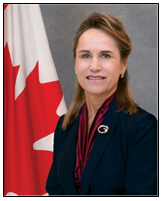
Ms. Greta Bossenmaier was appointed National Security and Intelligence Advisor to the Prime Minister of Canada in May 2018. In this role, Ms. Bossenmaier serves as the principal national security and intelligence advisor to the Prime Minister and Cabinet, from both a domestic and global perspective. She also works with the Canadian security and intelligence community to ensure a comprehensive and coordinated approach to national security and intelligence.
With extensive experience in the fields of security, intelligence, foreign affairs, and defence, Ms. Bossenmaier has held several senior positions across the federal government. Most recently, she served as Chief of the Communications Security Establishment, leading Government of Canada cyber security and foreign signals intelligence operations.
Previously, Ms. Bossenmaier served in the Privy Council Office as Deputy Minister of the Afghanistan Task Force; at Global Affairs Canada as both Senior Associate Deputy Minister of International Development and Associate Deputy Minister of Foreign Affairs; and, at the Canada Border Services Agency as Executive Vice-President and as Vice President of Innovation, Science, and Technology.
Ms. Bossenmaier began her career in the Canadian public service as a Defence Scientist in the Department of National Defence. She then accepted an international assignment with the United Nations in Geneva, Switzerland.
Ms. Bossenmaier holds a Master of Science Degree in Operational Research from Stanford University in California and a Bachelor of Commerce (Honours) Degree from the University of Manitoba.
In 2018, Ms. Bossenmaier was awarded the National Intelligence Distinguished Public Service Medal by the US Director of National Intelligence, for meritorious service.

David Morrison was appointed Foreign and Defence Policy Advisor to the Prime Minister on January 7, 2019. In addition, he is the Personal Representative of the Prime Minister for the G7 Summit since October 1, 2018.
Prior to this appointment, Mr. Morrison was Associate Deputy Minister of Foreign Affairs since November 2017 and was concurrently appointed as the Personal Representative of the Prime Minister for the G7 Summit in October 2018. Before that, he was Assistant Deputy Minister of the Americas Branch at Global Affairs. Mr. Morrison also completed a four year interchange assignment with the United Nations Capital Development Fund concluding in 2012.
Mr. Morrison re-joined the Public Service in 2012 after a career working with various NGOs and international organizations including the UN and Net Aid in the areas of communications and issues management. In the late 1980s and early 1990s, Mr. Morrison worked for the Department of Foreign Affairs and International Trade in various capacities including Desk Officer and Second Secretary and Vice Consul at the Canadian Embassy in Havana, Cuba.
Mr. Morrison holds a Bachelor of Arts, History from Yale University and a Master of Philosophy, International Relations from the University of Oxford.

Ian McCowan was appointed Deputy Secretary to the Cabinet (Legislation and House Planning and Machinery of Government) at the Privy Council Office on March 2, 2015. His title was changed to Deputy Secretary to the Cabinet (Governance) at the Privy Council Office on June 7, 2016.
Prior to his appointment, Mr. McCowan was Assistant Secretary to the Cabinet, Communications and Consultations, Privy Council Office (2012-2015) and Assistant Commissioner, Policy, Correctional Service of Canada (2006-2012).
He held a number of positions with the Department of Justice Canada, including Director and General Counsel, Correctional Service Canada Legal Services (2001-2006), Director and Senior Counsel, Parks Canada Agency Legal Services (1999-2001), and Counsel, Civil Litigation Section (1993-1999).
Mr. McCowan holds a Bachelor of Commerce and Bachelor of Laws from Queen’s University and a Master’s in Law from University of Cambridge.

Matthew Mendelsohn was appointed Deputy Secretary to the Cabinet (Results and Delivery) at the Privy Council Office on January 11, 2016.
Prior to this, Mr. Mendelsohn was the founding director of the Mowat Centre at the University of Toronto’s School of Public Policy and Governance, where his research included government transformation and better outcomes for public services.
From 2004 to 2005, Mr. Mendelsohn was Deputy Minister and Head of the Democratic Renewal Secretariat with the Government of Ontario. He was named Deputy Minister of Intergovernmental Affairs and Democratic Renewal in 2005 and in 2007 was appointed Deputy Minister and Associate Secretary of the Cabinet, in the Cabinet Office, with the Government of Ontario.
Mr. Mendelsohn obtained a Ph.D and Master’s degree in Political Science from l’Université de Montréal, in addition to a Bachelor of Arts degree from McGill University.

Janine Sherman was appointed Deputy Secretary to the Cabinet (Senior Personnel and Public Service Renewal) at the Privy Council Office on May 15, 2016.
Prior to this, she was Assistant Secretary to the Cabinet for Senior Personnel. From 2010-2014, Ms. Sherman worked as Director of Operations in the Machinery of Government Secretariat of the Privy Council Office (PCO). Prior to this, she worked for the Canada School of Public Service as Director General of Policy, Planning and Communications, and held various executive and policy development positions at PCO and the Department of Finance.
Ms. Sherman has a Bachelor of Arts degree in Economics and Commerce from the University of Manitoba, in addition to a Master of Arts degree in Economics from the University of Manitoba.

Philip Jennings was appointed Deputy Secretary to the Cabinet (Plans and Consultations) on October 15, 2018.
Prior to this he served as Associate Deputy Minister of Natural Resources. Also, he was the Assistant Deputy Minister, Industry Sector at Innovation, Science and Economic Development Canada from 2013 to 2016. Before this, he held the position of Associate Assistant Deputy Minister, Industry Sector at Industry Canada from 2010-2013.
Prior to joining Innovation, Science and Economic Development, Mr. Jennings held a variety of executive positions with Natural Resources Canada such as Assistant Deputy Minister of the Major Projects Management Office (2007-2010), Director General of the Petroleum Resources Branch (2004-2007), and Director of Frontier Lands Management (2003-2004).
Mr. Jennings holds a Bachelor of Social Science in Economics from the University of Ottawa and a Master of Economics from Queen’s University.
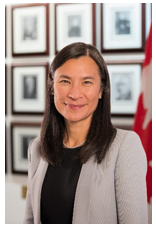
Thao Pham was appointed Deputy Secretary to the Cabinet (Operations) at the Privy Council Office on August 19, 2019.
Prior to this appointment, Ms. Pham served as Associate Deputy Minister, Transport Canada and Senior Vice-President of Operations at Parks Canada.
Before that, Ms. Pham worked at Infrastructure Canada where she was Assistant Deputy Minister for the Federal Montreal Bridges (2014-2016). Ms. Pham also worked as Vice-President of Operations at the Economic Development Agency of Canada for the Quebec Region (FRD) (2011-2013) and Vice-President of Operations for the Canadian Environmental Assessment Agency (2008-2010).
Ms. Pham holds a Master’s Degree, Environmental Sciences from Université du Québec à Montréal and a Bachelor of Science, Biology from McGill University.

Christiane Fox was appointed Deputy Secretary to the Cabinet (Intergovernmental Affairs and Youth) at the Privy Council Office on June 12, 2017.
Prior to this, Ms. Fox was Assistant Secretary to the Cabinet (Communications and Consultations) from 2015 to 2017. She served as Director General of Strategic Communications at the Privy Council Office from 2012 to 2015, and from 2008 to 2011, Ms. Fox held various positions at Innovation, Science and Economic Development Canada.
Ms. Fox holds a Master’s Certificate in Public Administration (Governance and Leadership) from the University of Ottawa and a Bachelor of Arts in Psychology and Communications from Carleton University.

Prime Minister's portfolio:
*The Prime Minister is also cross-appointed as the Minister of Youth
**Reports directly to the Governor General, not to a Minister
***Carries out both executive and Agent-of-Parliament-like functions
****Supported by the Administrative Tribunal Support Service of Canada
To exercise national leadership to promote public safety and emergency preparedness, including: crime prevention; cyber security; policing and law enforcement; security and intelligence; corrections and parole; border services; emergency management and response; and, cooperation with provinces, territories, municipalities, foreign states, and international organizations.
Overview: Public safety and emergency management are a shared federal, provincial, territorial, and municipal responsibility. The Royal Canadian Mounted Police provides federal policing (e.g. VIP protection, organized crime, money laundering, anti-terrorism and national security) and contract policing services to provinces, territories and municipalities. The Canada Border Services Agency enforces laws governing trade and travel including removing inadmissible people to Canada; facilitates cross-border traffic; and, collects duties and taxes. The Correctional Service of Canada manages federal correctional institutions; administers court-imposed sentences; and, supervises offenders on various forms of conditional and community release. The Canadian Security Intelligence Service investigates activities suspected of posing threats to the security of Canada and provides advice to federal departments and agencies; and, can take certain measures to reduce those threats.
From cyber threats to gun violence: Evolving technology and legal environment exacerbate the threat environment. Agencies need to adapt to sophisticated and frequent cyber threats, increases of foreign interference, hostile state activity as well as natural disasters. Border management and enforcement also face pressures from emerging security vulnerabilities, need for fast and secure border services and higher volumes of shipments and air travellers. Rising gun and gang violence, online child sexual exploitation, and human trafficking present challenges for law enforcement and the criminal justice system.
Complex operating pressures: The Royal Canadian Mounted Police continues to assess its needs for program integrity to address new staffing realities, the future of contract and Indigenous policing. Numerous workplace harassment cases have also exacerbated pressures for funding, resources and systemic policy changes. The Canada Border Services Agency is working to modernize its structure and operations, which includes adopting a risk-based approach to border management, greater automation, and streamlining processes. To deal with the growing number of federally sentenced women, the overrepresentation of Indigenous peoples and marginalized people in the federal correctional system, Correctional Service of Canada is continuing to adapt its approach to corrections and conditional releases, including adapting to an approach without administrative segregation (solitary confinement). The threat environment in Canada is complex and continuously evolving. The Canadian Security Intelligence Service is assessing existing authorities in the face of operational and legal risks stemming from this dynamic environment.

Gina Wilson was appointed Deputy Minister of Public Safety on May 6, 2019.
Prior to her appointment, Ms. Wilson was Deputy Minister of the Department for Women and Gender Equality, since 2017. Before that, she was Associate Deputy Minister at Public Safety since 2015. Prior to this, she was Associate Deputy Minister at Employment and Social Development Canada, where she served the Minister of State for Seniors and the Minister of State for Social Development, while tackling departmental efforts to reduce the backlog at the Social Security Tribunal.
Ms. Wilson was Assistant Deputy Minister of Emergency Management and Regional Operations at Public Safety Canada (2011-2013), and then was Senior Assistant Deputy Minister, Treaties and Aboriginal Government at Aboriginal Affairs and Northern Development Canada.
Ms. Wilson was appointed in 2006 as Assistant Deputy Minister with Indian Residential Schools Resolution Canada and was a partner in the implementation of a settlement agreement for approximately 80,000 survivors of Indian Residential Schools in Canada. Her office oversaw the co-ordination of events leading to the Prime Minister's historic apology on June 11, 2008. She then was named Senior Assistant Deputy Minister, Regional Operations, at Indian and Northern Affairs Canada.
She began her career in her First Nation community of Kitigan-Zibi as Executive Director of Health and Social Services and as Director of the Wanaki Treatment Centre. Ms. Wilson was a Senior Manager with the Assembly of First Nations (AFN), a national Aboriginal organization representing First Nation communities in Canada, when she joined the Federal Public Service in 1996. For five years she served as Director General, Aboriginal Affairs at Correctional Service Canada. In 2003, Ms. Wilson became Director General at Human Resources Skills Development Canada, before moving to the Privy Council Office in 2005 as Director General of Engagement, where she organized a First Ministers meeting.
Ms. Wilson holds a Bachelor of Social Sciences from the University of Ottawa.

Monik Beauregard was appointed Associate Deputy Minister of Public Safety on August 12, 2019.
Prior to her appointment, Ms. Beauregard was Senior Assistant Deputy Minister, National and Cyber Security Branch at Public Safety Canada. Before that, Ms. Beauregard was Director General, Enforcement and Intelligence Programs Directorate for the Canada Border Services Agency between 2014 and 2016, Executive Director for the Integrated Terrorism Assessment Centre between 2009 and 2014, and Deputy Executive Director, Intelligence Assessment Staff for the Privy Council Office between 2003 and 2009.
Ms. Beauregard started her Public Service career with the Department of National Defence. She holds Master and Bachelor degrees in Political Science from the Université de Montréal .

To deliver high-quality services and programs that meet the needs of federal organizations and ensure sound stewardship on behalf of Canadians in the purchase of goods and services, the administration of payments and accounting, and the maintenance of properties and infrastructure.
Overview: Public Services and Procurement Canada (PSPC) is the largest federal owner and manager of office space in the country, providing accommodation and services to Parliamentarians and more than 260,000 public servants and provides laboratory facilities for science programs. It is also Canada's largest payroll administrator, handling compensation for more than 300,000 government pay accounts in addition to being Canada's largest pension administrator with more than 890,000 active and retired pensioner accounts and annual payroll of $21 billion. PSPC is the central purchaser for the Government of Canada, managing approximately $16 billion of procurements on behalf of other federal departments and agencies. It is also the largest translation organization within Canada providing translation, interpretation and terminology services to federal departments, agencies, and Parliamentarians.
Pay system: Since it went live in 2016, Phoenix has caused pay problems for more than half of federal public servants. While significant progress has been made to stabilize the system through increased capacity, technical improvements and management and accountability controls, there remain more than 450,000 backlogged transactions as of September 2019; down from a peak of 633,000 in January 2018. In addition to its efforts to stabilize Phoenix, PSPC is engaged with Treasury Board Secretariat in the transition plan between Phoenix and the Next Generation HR Pay System. [ * ]
Modernizing procurement: PSPC is developing and implementing an e-procurement solution to make procurement processes easier, faster and more accessible.
Defence procurement: PSPC supports significant capital investments in equipment for the Canadian Armed Forces and renewal of the Canadian Coast Guard fleet. A number of complex, highly visible procurements will reach key milestones early in the new mandate (e.g., receipt and evaluation of bids for the new fighter jet fleet and selection of a third shipyard for the National Shipbuilding Strategy).
SSC 3.0: Launched to establish a reliable, modern, secure and accessible digital platform; support a digitally-enabled public service; and provide modern and efficient infrastructure solutions.
Information Technology (IT) Challenges: [ * ]

Bill Matthews was appointed Deputy Minister of Public Services and Procurement Canada on January 28, 2019.
Prior to this appointment, Mr. Matthews held the position of Senior Associate Deputy Minister for the National Defence from 2017 to 2019. He also held the position of Comptroller General of Canada for three years. From 2011 to 2014, Mr. Matthews was Assistant Secretary, Expenditure Management Sector, at the Treasury Board of Canada Secretariat. Before joining the Expenditure Management Sector, Mr. Matthews worked at the Office of the Comptroller General for seven years, serving as the Assistant Comptroller General in the Financial Management and Analysis Sector from 2009 to 2011.
Mr. Matthews is a chartered professional accountant with over 25 years of experience in accounting and financial management in both the public and private sectors.
He also serves as a board member of the Public Sector Accounting Board and the University of Ottawa’s Institute for Mental Health Research.
Mr. Matthews holds a Bachelor of Commerce from Dalhousie University.

Les Linklater was appointed Associate Deputy Minister of Public Services and Procurement Canada on March 6, 2017.
Previously, Mr. Linklater was Deputy Secretary to the Cabinet (Operations) at the Privy Council Office. He has also held the position of Assistant Secretary to the Cabinet, Social Development Policy, Privy Council Office from 2014 to 2015.
He served as Assistant Deputy Minister for Strategic and Program Policy at Citizenship and Immigration Canada, from 2009 to 2014, where he was responsible for overseeing policy and program development related to admissibility, selection, refugees and stakeholder relations, as well as corporate planning and information sharing. Some of the policy initiatives in which Mr. Linklater was involved include: the launch of the Canadian Experience Class; the introduction of Ministerial Instructions to make the Federal Skilled Worker program more responsive to Canadian labour market needs; amendments to regulations to enhance protections for temporary foreign workers and to protect potential immigrants from fraudulent consultants.
Prior to this, he held positions in both policy development and service delivery at Citizenship and Immigration Canada and Human Resources Development Canada, including oversees postings as a Foreign Service Officer in Manila and Damascus.
Mr. Linklater holds a Bachelor of Arts in Political Science from the University of Alberta.

Michael Vandergrift was appointed Associate Deputy Minister of Public Services and Procurement Canada on November 27, 2017.
Prior to this appointment, he served at Treasury Board Secretariat as Assistant Secretary for the International Affairs, Security and Justice Sector from 2015 to 2017 and as Assistant Secretary of Regulatory Affairs from 2014 to 2015.
Mr. Vandergrift began his executive career at Health Canada (2003) where he served as a Director in the Health Science Policy and Health Care System division and as Director General, Policy, Planning and International Affairs from 2007-2010. He was Director of Operations at the Privy Council Office from 2010-2014.
Mr. Vandergrift holds a Master of Science, Policy and Administration, Health Policy Analysis, London School of Economics and a Bachelor of Arts, Political Science, University of Alberta.

Janet King was appointed Associate Deputy Minister of Public Services and Procurement Canada on August 13, 2018.
Prior to this appointment, she was the President of the Canadian Northern Economic Development Agency (CanNor) from 2014 to 2018. Since joining the Federal Public Service in 1985, Ms. King has worked at Natural Resources Canada as a research scientist, in senior management roles in the Health Products and Food Branch, Health Canada, and in several sector development branches (Life Sciences, Service Industries and Consumer Products with the Industry Sector) at Industry Canada.
Prior to joining CanNor, she was Assistant Deputy Minister of the Northern Affairs Organization at Aboriginal Affairs and Northern Development Canada, and Assistant Deputy Minister of Policy and Strategic Direction in Western Economic Diversification Canada.
Ms. King has a Bachelor of Science from the University of Toronto, and a Master of Science and Ph.D. from Queen's University, all in the field of geology.

Paul Glover was appointed President of Shared Services Canada on January 7, 2019.
Mr. Glover previously served as President of Canadian Food Inspection Agency from October 2016 to January 2019 and as the Associate Deputy Minister of Health Canada from July 2013 to October 2016.
Prior to his appointment as Associate Deputy Minister of Health Canada, Mr. Glover was Assistant Deputy Minister of the Health Products and Food Branch.
Mr. Glover was the ADM of the Healthy Environments and Consumer Safety Branch at Health Canada from September 2008 to January 2011. Prior to that, he was in the Privy Council Office's Operations Branch, where he worked on a wide range of social policy issues. He began his career at Health Canada in 1986, in the informatics area. Mr. Glover then moved on to health systems management and assumed progressively more responsible jobs, eventually leading to Director General of a number of business units, including First Nations and Inuit Health Programs, the Non-Insured Health Benefits Program, and the Safe Environments Program.
Over the years he has served on numerous governing bodies, including the Board of Directors of the Queensway Carleton Hospital, the Advisory Board for the Canadian Institutes of Health Research, and the Queen's University Board of Directors for the Centre for Water and the Environment. He has been a member of the National Academies of Science in the United States and the International Joint Commission.
Mr. Glover has a Master in Business Administration from Queen's University.

Sarah Paquet was appointed Executive Vice-President of Shared Services Canada on February 28, 2018.
Prior to her appointment, she was Assistant Deputy Minister, Integrated Services Branch, Shared Services Canada.
Before joining Service Canada, Ms. Paquet worked for the Department of Justice Canada as Executive Director and General Counsel for Public Works and Government Services Canada, as well as for the Canadian Food Inspection Agency's Legal Services. Prior to this, Ms. Paquet occupied various positions in Health Canada's Legal Services. She also worked in general legal practice in Gatineau, which focused on civil, commercial and family law.
Ms. Paquet holds two law degrees from the University of Ottawa: civil law and common law. She has been a member of the Barreau du Québec since 1994.

*Minister is also the Receiver General for Canada
Transport Canada provides overarching leadership on transportation issues in Canada, and is the central federal institution within the broader transport portfolio. Transport Canada is responsible for transportation policies and programs that aim to ensure and promote safe, secure, efficient and environmentally responsible transportation.
Overview: Canada’s transportation system is becoming increasingly more complex and interconnected. It plays a vital role in the lives of Canadians and Canada’s economy by linking people to jobs, delivering products to consumers, and connecting regions and communities to each other and international markets.
Growth Outlook - Optimizing Safety and Competitiveness: With growing passenger and freight volumes, there is increased pressure for the current high standards Canadians have come to expect in terms of the safety, security and efficiency of the transportation system to be maintained and enhanced.
Promoting Sustainability: The transportation sector poses direct and indirect environmental impacts that are complex and multidimensional. De-carbonization will remain a challenge as the economy and population grow faster than the scale-up of new technologies and alternative fuels. Pressures are also rising to ensure the sector is resilient and able to adapt to the impacts of a changing climate.
Harnessing Technological Change: The way that people and goods travel, particularly in urban areas, is changing rapidly, driven by a series of converging technological and social trends. Appropriate adoption of new and emerging technologies within the transportation sector will be a key enabler of optimizing supply chain efficiency and the movement of people.

Michael Keenan was appointed Deputy Minister of Transport on March 14, 2016.
He came to Transport Canada from Natural Resources Canada, where he served as the Associate Deputy Minister since 2013.
Before that, at Environment Canada he was responsible for strategic policy development, economic analysis of environmental policy and regulatory initiatives, coordination of federal-provincial relations, and the Federal Sustainable Development Strategy. He also served as the Vice-President of Organizational Leadership at the Canada School of Public Service and as the Director General of Economic Analysis at Agriculture and Agri-Food Canada, where he also chaired the OECD Committee of Agriculture.
Earlier in his public service career, Mr. Keenan worked in central agencies: in the Priorities and Planning Secretariat at the Privy Council Office, in various positions at Finance Canada and at the British Columbia Ministry of Finance.
Mr. Keenan holds a Bachelor of Arts (Honours) from Saint Francis Xavier University and a Master of Arts in economics from Queen's University.

*This portfolio also includes 17 port authorities (shared governance, federal incorporated, financially self-sustaining, non-share capital corporations)
**Supported by the Administrative Tribunal Support Service of Canada
To produce effective people, policies, and management of the public purse through its four core responsibilities of spending oversight, administrative leadership, employer relations, and regulatory oversight.
Overview: The Treasury Board is a Cabinet committee of ministers that oversees the government’s financial, human resources and administrative responsibilities, and establishes policies and regulations that govern each of these areas. The Board has overarching responsibilities as the government’s management office by approving policies and providing guidance that will allow for a prudent and effective management of the government’s assets, financial information, and technology resources; spending oversight by examining and approving proposed spending plans and reviewing the development and performance of approved programs; and acting as the government’s people management office by managing compensation, organization and classification, labour relations, collective bargaining, pensions and benefits for the public service.
Service Delivery and Program Management: TBS is leading on the pilot initiative for the next generation pay system and is continuing work with Public Services and Procurement Canada on stabilization of the Phoenix pay system, along with implementation of the agreement with bargaining agents for damages related to Phoenix.
Regulatory Oversight: TBS is undertaking three major regulatory initiatives: 1) Under its statutory requirement, TBS is undertaking consultations and analysis with internal and external stakeholders, to inform the Red Tape Reduction review, including assessing opportunities for legislative changes; 2) The Department is coordinating the annual regulatory modernization bill that will allow departments and agencies to amend their legislation, remove outdated or duplicated requirements, and allow for updates; and [ * ]
Litigation: Two class actions have been initiated to seek compensation for Phoenix related pay issues: Bouchard c. Procureur Général du Canada , and Delorme v. Attorney General of Canada and IBM Canada. In the former, the Quebec Court of Appeal will hear the Plaintiffs’ appeal on November 21, 2019.

Peter Wallace was appointed Secretary of the Treasury Board Secretariat on April 4, 2018.
Mr. Wallace began his public service career with the Government of Ontario in 1981 and established a legacy of distinguished leadership for more than 32 years. He served as Secretary to Cabinet and Head of the Ontario Public Service, in addition to Deputy Minister of Finance and Secretary to Treasury Board. Other senior positions include Deputy Minister of Energy and Associate Secretary of Cabinet, and Deputy Minister, Policy. Most recently, he was the Ontario Public Service Visiting Fellow at the School of Public Policy and Governance at the University of Toronto.

Erin O’Gorman was appointed Associate Secretary of the Treasury Board Secretariat on July 9, 2018.
Prior to this appointment, Mrs. O’Gorman was Assistant Secretary, Government Position Sector within Treasury Board Secretariat (2017-2018). She served as Assistant Deputy Minister at Natural Resources (2015-2017). Before that she was Director General, Aviation Security at Transport Canada (2011-2015). She also worked for the Pricy Council Office as Director of Operations (2007-2010) and as Chief of Staff to the National Security Advisor (2006-2007).
Mrs. O’Gorman holds a Master of Public Administration from Carleton University and a Bachelor of Arts, Political Studies from Queen’s University.

Nancy Chahwan was appointed Chief Human Resources Officer on August 29, 2018.
Prior to this appointment, Ms. Chahwan was Deputy Commissioner of Revenue. Before that, she was Assistant Secretary of the Government Operations Sector at Treasury Board Secretariat, from April 2015 to March 2017.
Before joining the Treasury Board Secretariat, Ms. Chahwan occupied various positions at the former Public Works and Government Services Canada as Assistant Deputy Minister of the Parliamentary Precinct Branch (2013-2015); Executive Director General of the Real Property Branch (2012-2013); Regional Director General for the Québec region (2009-2012); Regional Director of the Portfolio Management, Real Property Branch (2008-2009) and Regional Director of Corporate Services, Strategic Planning and Communications (2005-2008).
Ms. Chahwan has a Bachelor of Arts in Business Administration from l’École des hautes études commerciales.

Roch Huppé was appointed Comptroller General of Canada on October 23, 2017.
Prior to this appointment, Mr. Huppé was Assistant Commissioner and Chief Financial Officer at the Canada Revenue Agency (CRA) for the four previous years. Before joining CRA, Mr. Huppé was Chief Financial Officer at the Department of Fisheries and Oceans from 2010 to 2013.
Mr. Huppé also worked at Global Affairs Canada as Director General for the Finance Branch from 2008 and 2010. Before this, he worked at Public Services and Procurement Canada (then known as Public Works and Government Services Canada) from 2004 to 2008, in various executive capacities in the Program Delivery and Operations Branch and Finance Branch.
Mr. Huppé holds a Bachelor in Business Administration with specialization in Finance from the Université du Québec , a Certificate in Accounting from Université du Québec , and a Master of Public Administration from École nationale d’administration publique. He is a Chartered Professional Accountant.

Yazmine Laroche was appointed Deputy Minister, Public Service Accessibility on August 7, 2018.
Prior to this appointment, Ms. Laroche was Associate Deputy Minister of Infrastructure and Communities since 2013. Ms. Laroche has over twenty-five years’ of experience in public policy, program design and delivery, communications, strategic planning and corporate management, having served in a variety of federal government departments, including Communications, Canadian Heritage, the Canada Information Office, Privy Council Office, Treasury Board Secretariat and Infrastructure Canada.
She began her public service career as a junior communications officer in Transport Canada. She was appointed as an Assistant Deputy Minister in 2000.
In 2004, Ms. Laroche joined the Privy Council Office to develop the Government of Canada's New Deal for Cities. In 2009, she was appointed Assistant Deputy Minister, Executive Policies and Talent Management in the Office of the Chief Human Resources Officer.
Ms. Laroche holds a Bachelor of Arts from Carleton University.

Taki Sarantakis was appointed President of the Canada School of Public Service on July 9, 2018.
Prior to this appointment, Mr. Sarantakis was Associate Secretary of the Treasury Board Secretariat from 2016 to 2018.
Mr. Sarantakis served as Assistant Secretary of the Economic Sector with Treasury Board Secretariat from 2013 to 2016.
Prior to this, Mr. Sarantakis held numerous positions at Infrastructure Canada, such as Assistant Deputy Minister of Policy and Communications (2009-2013), Associate Assistant Deputy Minister of Policy and Communications (2009), and Director General of Policy and Priorities (2002-2009).
He had previously worked for Treasury Board Secretariat with the Infrastructure National Office as Principal Policy Analyst (2001-2002) and Senior Analyst (2000-2001).
Mr. Sarantakis holds both a Bachelor of Arts and a Master of Arts in Political Science from York University. Prior to joining the Federal Public Service, he was a Doctoral Candidate in Political Science at the University of Toronto.

To provide exemplary, client-centred services and benefits that respond to the needs of veterans, other clients and their families, in recognition of their services to Canada, and to keep the memory of their achievements and sacrifices alive for all Canadians. Veterans’ well-being and the elimination of barriers to re-establishment in civilian life are central to the department’s mandate.
Overview: Canada’s Veteran population is an estimated 649,300 (1 out of 57 Canadians is a veteran). Veterans Affairs Canada provides a wide range of programs and services to support transition and well-being. The portfolio also includes a Veterans Review and Appeal board (an independent administrative tribunal that provides an appeal for disability benefit decisions) and a Veterans Ombudsmen (who reviews complaints by clients, identifies and reviews systemic issues, and facilitates access to services).
Stakeholder considerations: Veteran stakeholders in Canada play a strong role in advocating for veterans’ rights, issues and remembrance activities. The department consults broadly, including through ministerial advisory groups. Recent issues raised by stakeholders include the adequacy of financial benefits, homelessness and mental health.
Pace of change: The department’s annual budget has increased significantly from $2.9 billion in 2005-06 to $4.43 billion in 2019-20, largely as a result of changes in the type and amount of supports provided to veterans and their families. Concurrently, Veterans Affairs Canada’s income and other programs have undergone substantial change, including the design of its disability benefits regime.
New benefits regime: On April 1, 2019, the department implemented Pension for Life, a new benefits regime. There has been some criticism that new benefit recipients, particularly Canada’s most critically injured veterans, could receive less under the regime. The department is analyzing potential gaps.
Turnaround time for services: In spite of investments to enhance capacity, turnaround times continue to be a challenge because of the complexity of the benefits regime, as well as an increase in program demand and a greater awareness of programs. The number of pending applications is 42,000, of which 18,000 exceed the 16-week service standard. Beyond long wait times, a commitment to a 25:1 veteran to case manager ratio remains unmet. Currently, the ratio sits at 33:1.

General Walter Natynczyk was appointed Deputy Minister of Veterans Affairs on November 3, 2014.
General Walter Natynczyk joined the Canadian Forces in 1975 and served in numerous regimental command positions at all levels.
General Natynczyk's operational experience consists of four years on NATO duty in Germany; six months of UN peacekeeping duties in Cyprus (1989); a one-year-long mission with the United Nations in the Former Yugoslavia as Sector South-West Chief of Operations in Bosnia and Herzegovina (1994) with British forces, then as the Chief of Land Operations, UNPROFOR HQ in Zagreb, Croatia (1995). He commanded the Royal Canadian Dragoons in domestic operations during the Winnipeg floods of 1997, as well as in the Ottawa region during the 1998 Ice Storm.
He returned to Bosnia-Herzegovina in 1998-1999, where he served as the Canadian Contingent Commander.
As an exchange officer, he served as Deputy Commanding General, III (US) Armored Corps at Fort Hood, Texas and deployed with the Corps to Baghdad, Iraq throughout 2004, serving first as the Deputy Director of Strategy, Policy and Plans and subsequently as the Deputy Commanding General of the Multi-National Corps.
Upon his return to Canada, he assumed command of the Canadian Army's Doctrine and Training System. He was subsequently appointed Chief of Transformation, where he was responsible for implementation of the force restructure. He served as the Vice Chief of the Defence Staff from 2006-2008. General Natynczyk served as Canada's Chief of Defence Staff from July 2008 to October 2012.
General Natynczyk was President of the Canadian Space Agency from August 2013 to November 2014.
General Natynczyk attended Royal Roads Military College, Victoria, BC and Collège Militaire Royal, Saint-Jean, QC (Business Administration). He is a graduate of the Canadian Forces Command and Staff College, the U.K. All-Arms Tactics Course and the US Army War College (Master in Defence Studies).

Lisa Campbell was appointed Associate Deputy Minister of Veterans Affairs on February 5, 2018.
Prior to her appointment, Ms. Campbell was Assistant Deputy Minister, Defence and Marine Procurement at Public Services and Procurement Canada from 2015 to 2018.
She was Senior Deputy Commissioner, Mergers at Innovation, Science and Economic Development (2014-2015) and Deputy Commissioner, Fair Business Practices Branch also at Innovation, Science and Economic Development (2010-2014).
Ms. Campbell holds a Bachelor of Law from Dalhousie University and a Bachelor of Social Science from McGill University.